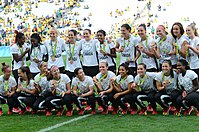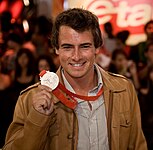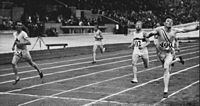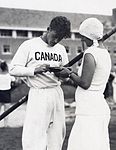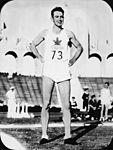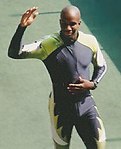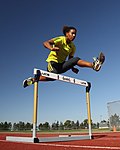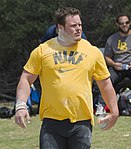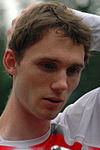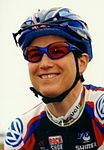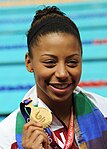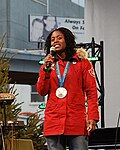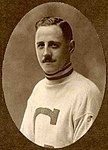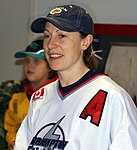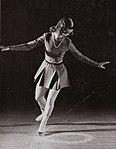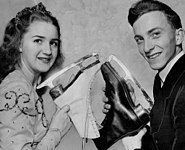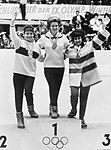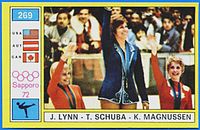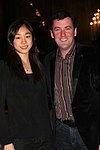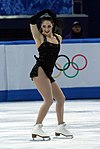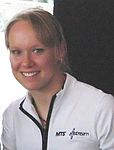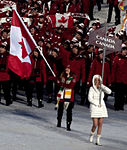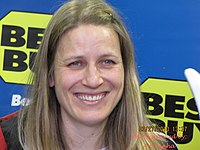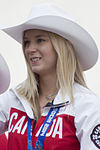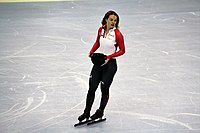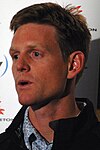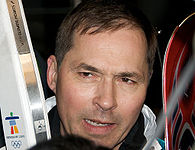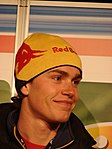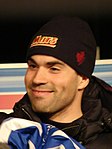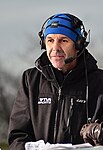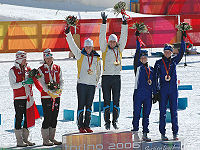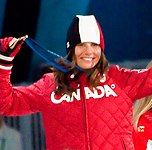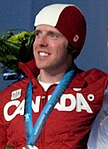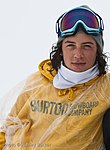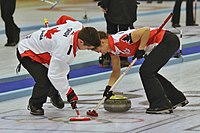Olympic history of Canada
|
|
|
|
|---|---|---|
| 136 | 166 | 199 |
Canada , whose NOK , the Canadian Olympic Committee , was founded in 1904 andrecognizedby the IOC in1907, has been sending athletes to the Olympic Games since 1900. Canada subsequently took part inall summer gameswith the exception of the boycotted games in Moscow in 1980. Canadian athletes also participated in all winter games.
Canada also participated in the 1906 Summer Olympics in Athens and at the Youth Olympic Games in part.
Canada is the host of three Olympic Games. The 1976 Summer Games took place in Montreal , the 1988 Winter Games in Calgary and the 2010 Winter Games in Vancouver .
General
Canada is one of the nations that has won at least one medal in all of its participation. Canada is the leading nation in three sports. Canada won 13 gold medals in ice hockey, nine in men's tournaments and four in women. The next best nation is the USA with seven Olympic victories. Canada is also leading in curling with five gold medals, three from men's teams and two from women's teams. The next best team, Sweden, has two winning teams. The third sport in which Canada is the leader is no longer played today. Lacrosse was an Olympic sport in 1904 and 1908, both tournaments were won by Canada.
The first Canadian Olympians were the hurdler George Orton and the middle-distance runner Alex Grant , who competed in Paris on July 14, 1900 . George Orton was the first Canadian medalist and Olympic champion when he won the 2500 meter obstacle race on July 15, 1900.
The figure skater Cecil Smith became the first Canadian woman to take part in the Olympic Games on January 28, 1924 in Chamonix . The first medal was won by a Canadian on July 31, 1928 in Amsterdam , when Fanny Rosenfeld won the silver medal over 100 meters. The first female Olympic champion was Ethel Catherwood on August 4, 1928 , who won the high jump.
The most successful athletes are two women. Clara Hughes and Cindy Klassen each won six medals. The most successful Olympians in terms of the number of gold medals are ice hockey players Jayna Hefford , Caroline Ouellette and Hayley Wickenheiser , both of whom became four Olympic champions between 2002 and 2014. The most successful man is Marc Gagnon , who won three gold and two bronze medals in the short track between 1994 and 2002 .
Clara Hughes is one of the athletes who competed in both summer and winter games. She is one of the few female athletes who has won medals at summer and winter games. Even Pierre Harvey attended Winter Games in both summer and. In 1976 and 1984 he was active as a cyclist. Before Los Angeles he was a cross-country skier in Sarajevo in 1984.
Canada's first Olympic team in 1900 included four athletes. The number of participants first increased to 87 athletes in London in 1908. Then the number of participants fell until 1932 for the first time over 100 athletes took part. Over 200 athletes first traveled to Munich in 1972. The largest team with 407 athletes took part in 1984 in Los Angeles. With 220 winter athletes, the team in Sochi in 2014 was the one with the most participants in the winter games.
The most successful games ever were the 2010 domestic winter games. 26 medals, most of them from winter games, were won. 14 Olympic victories were celebrated in Vancouver. The most successful summer games were the 1984 Los Angeles Games with 10 Olympic victories. A total of 44 medals were won here, most of them from all Olympic Games. Canada is the only nation that has not been able to win a gold medal by hosting the Olympic Games. Canadian athletes won five silver and six bronze medals in Montreal in 1976, and two silver and three bronze medals in Calgary in 1988.
The show jumper Ian Millar , together with the Austrian sailor Hubert Raudaschl , is the Olympian with the most participations. Millar traveled to the Olympic Games ten times. Millar had his first assignment in the show jumping equipe in 1972 in Munich, his last in 2012 in London. The boycott of the 1980 Games prevented Millar from completing an eleventh participation, making him the sole record holder.
The youngest medalist and Olympic champion is swimmer Penny Oleksiak , who won one gold, one silver and two bronze medals in 2016 at the age of 16. This also makes her the first female athlete to win four medals at the same summer games. Together with her relay mate Taylor Ruck , she is the first female medalist to be born in the 21st century after winning the bronze medal in the 100-meter freestyle relay .
From 1960 to 2012 sports journalist Richard Garneau reported on the Olympic Games. Garneau worked as a journalist at a total of 23 Olympic Games, both summer and winter. Only in 1996 in Atlanta and 1998 in Nagano he was not there. Garneau died in January 2013. During the 2014 Winter Games in Sochi, he was posthumously awarded the Pierre de Coubertin Medal .
Canada has three IOC members. In 1978 Richard Pound , who participated as a swimmer in 1960, was elected an IOC member. Since 2015 Hayley Wickenheiser IOC member. The four-time ice hockey Olympic champion is also a member of the IOC's athletes' commission. In 2016 the rower Tricia Smith was elected an IOC member. Smith competed in the Olympics in 1976, 1984 and 1988 and won a silver medal in 1984. She is Vice President of the World Rowing Federation FISA , as well as President of the Canadian NOK.
Applications and hosting of the Olympic Games
Applications
Summer games
The cities of Montreal and Toronto submitted multiple applications to host the Olympic Games . In 1940, both cities applied to host the 12th Olympic Games in 1940. Both failed without a vote in the first ballot. Montreal then applied for the following 13th Olympic Games in 1944. Again, Montreal failed without a vote in the first ballot.
Montreal only applied again to host the 16th Olympic Games in 1956. As before, no vote was taken in the first ballot and was eliminated. Montreal submitted the next application for the 20th Olympic Games in 1972. Here you failed in the second ballot with 16:31 votes to Munich . Competitor Madrid got only 13 votes.
The application to host the 21st Olympic Games in 1976 was then successful for Montreal. The competitors Los Angeles and Florence were eliminated after the first ballot. In the second ballot, the application was approved with 41:28 votes against Moscow .
Toronto then applied for the 26th Olympic Games in 1996 and was only eliminated in the fourth ballot. Melbourne , Manchester and Belgrade had previously been eliminated. Toronto failed with 22 votes against 30 votes for Athens and 34 votes for Atlanta .
Toronto competed for the 29th Olympic Games in 2008 together with Beijing , Paris , Istanbul and Osaka . Osaka was eliminated in the first ballot. Beijing got over 50% of the votes in the second ballot (56), Toronto was behind with 22 votes, ahead of Paris (18) and Istanbul (9).
Winter games
Five Canadian cities have applied to host the Winter Olympics. It started in 1932 Montreal , which failed because of Lake Placid . In 1936 Garmisch-Partenkirchen was preferred to Montreal . For the organization of the 5th Olympic Winter Games in 1944 it was not eliminated until the second ballot. The winner was Cortina d'Ampezzo . When applying for the 7th Winter Olympics in 1956, Montreal lost again to Cortina d'Ampezzo, this time in the first ballot.
Calgary first applied to host the 9th Olympic Winter Games in 1964, but lost 9:49 votes to Innsbruck in the first ballot. Even in the application for the 10th Olympic Winter Games in 1968 they lost. In the first ballot you were behind Grenoble with three votes, in the second ballot you were ahead with one vote. In the decisive third ballot, Calgary lost with 24:27 votes.
The application for the 11th Winter Olympics in 1972 came from Banff . The winter sports resort was defeated in the first ballot by 16:32 votes from the Japanese city of Sapporo . Vancouver applied for the 12th Winter Olympics in 1976, but was eliminated in the first ballot with nine votes. Vancouver's application for the 13th 1980 Winter Olympics was withdrawn.
Calgary submitted an application for the 15th 1988 Winter Olympics. In the second ballot, the Swedish city of Falun won 48:31. Only for the 21st Olympic Winter Games 2010 was the next Canadian application. Vancouver lagged behind the South Korean city of Pyeongchang with eleven votes in the first ballot . But in the second ballot, Vancouver prevailed with 56:53 votes.
Alignment
The first Olympic Games on Canadian soil were the 1976 Summer Games in Montreal , which took place from July 17 to August 1, 1976. 6084 athletes, including 1260 women, from 92 countries took part. 24 African countries boycotted the games. The IOC had refused to exclude New Zealand from the games because a New Zealand rugby selection had toured South Africa , breaking the international sports ban against the country. Guyana also stayed away from the games out of solidarity . The Olympic flame was lit by the young athletes Stéphane Préfontaine and Sandra Henderson. The Olympic oath for the athletes was taken by the weightlifter Pierre Saint-Jean, the oath for the referees by the athletics referee Maurice Fauget.
From February 13 to 28, 1988, the Winter Games took place in Calgary . 1423 athletes, including 313 women, from 57 countries took part. The 12-year-old young figure skater Robyn Perry lit the Olympic flame. Cross-country skier Pierre Harvey took the Olympic oath for the active players, and former figure skater Suzanne Morrow for the judges . Morrow was the first woman to take the oath at the Winter Olympics.
The 23rd Winter Olympics took place in Vancouver from February 12th to 28th, 2010. 2566 athletes, including 1044 happy athletes, from 82 countries took part. This made Vancouver the largest city to host Winter Games to date. The Olympic flame was lit this time by four athletes: speed skater Catriona LeMay Doan , former basketball player Steve Nash , former ski racer and Senator Nancy Greene and former ice hockey player Wayne Gretzky . Ice hockey player Hayley Wickenheiser took the Olympic oath for the active players, and the short track referee Michel Verrault for the referees. The Vancouver Games were very successful for Canada. Canada became the first Winter Games host nation since 1952 to top the medal table. The 14 gold medals signified a new record of Olympic victories in a Winter Games. The previous record was 13, set by the Soviet Union in Innsbruck in 1976, equalized by Norway in Salt Lake City in 2002.
Overview of the participations
Summer games
| year | Athletes | Flag bearer | Medals | ||||||
|---|---|---|---|---|---|---|---|---|---|
| total | m | w |
|
|
|
total | rank | ||
| 1896 | not participated | ||||||||
| 1900 | 4th | 4th | 0 | 1 | 1 | 2 | 13 | ||
| 1904 | 56 | 56 | 0 | 4th | 1 | 1 | 6th | 4th | |
| 1908 | 87 | 87 | 0 | Edward Archibald | 3 | 3 | 10 | 16 | 7th |
| 1912 | 36 | 36 | 0 | Duncan Gillis | 3 | 2 | 3 | 8th | 9 |
| 1920 | 52 | 52 | 0 | Archie McDiarmid | 3 | 3 | 3 | 9 | 12 |
| 1924 | 65 | 65 | 0 | Hector Phillips | 3 | 1 | 4th | 20th | |
| 1928 | 68 | 61 | 7th | Joseph Wright | 4th | 4th | 7th | 15th | 10 |
| 1932 | 100 | 83 | 17th | George Maughan | 2 | 5 | 8th | 15th | 12 |
| 1936 | 96 | 78 | 18th | James Worrall | 1 | 3 | 5 | 9 | 17th |
| 1948 | 104 | 89 | 15th | Robert McFarlane | 1 | 2 | 3 | 25th | |
| 1952 | 107 | 97 | 10 | Bill Parnell | 1 | 2 | 3 | 21st | |
| 1956 | 96 | 81 | 15th | Robert Steckle | 2 | 1 | 3 | 6th | 15th |
| 1960 | 85 | 74 | 11 | Carl Schwende | 1 | 1 | 32 | ||
| 1964 | 115 | 95 | 20th | Gilmour Boa | 1 | 2 | 1 | 4th | 22nd |
| 1968 | 139 | 111 | 28 | Roger Jackson | 1 | 3 | 1 | 5 | 23 |
| 1972 | 208 | 157 | 50 | Doug Rogers | 2 | 3 | 5 | 27 | |
| 1976 | 385 | 261 | 124 | Abby Hoffman | 5 | 6th | 11 | 27 | |
| 1980 | not participated | ||||||||
| 1984 | 408 | 255 | 151 | Alexander Baumann | 10 | 18th | 16 | 44 | 6th |
| 1988 | 328 | 223 | 105 | Carolyn Waldo | 3 | 2 | 5 | 10 | 19th |
| 1992 | 295 | 179 | 116 | Mike Smith | 7th | 4th | 7th | 18th | 11 |
| 1996 | 304 | 152 | 152 | Charmaine Crooks | 3 | 11 | 8th | 22nd | 21st |
| 2000 | 294 | 150 | 144 | Caroline Brunet | 3 | 3 | 8th | 14th | 24 |
| 2004 | 263 | 130 | 133 | Nicolas Gill | 3 | 6th | 3 | 12 | 21st |
| 2008 | 332 | 186 | 146 | Adam van Koeverden | 3 | 9 | 7th | 19th | 19th |
| 2012 | 273 | 119 | 154 | Simon Whitfield | 1 | 5 | 12 | 18th | 36 |
| 2016 | 314 | 128 | 186 | Rosannagh MacLennan | 4th | 3 | 15th | 22nd | 20th |
Winter games
| year | Athletes | Flag bearer | Medals | ||||||
|---|---|---|---|---|---|---|---|---|---|
| total | m | w |
|
|
|
total | rank | ||
| 1924 | 12 | 11 | 1 | Ernie Collett | 1 | 1 | 8th | ||
| 1928 | 23 | 20th | 3 | John Porter | 1 | 1 | 5 | ||
| 1932 | 42 | 38 | 4th | Hack Simpson | 1 | 1 | 5 | 7th | 4th |
| 1936 | 29 | 22nd | 7th | Walter Kitchen | 1 | 1 | 9 | ||
| 1948 | 28 | 24 | 4th | 2 | 1 | 3 | 6th | ||
| 1952 | 39 | 31 | 8th | Gordon Audley | 1 | 1 | 2 | 6th | |
| 1956 | 35 | 27 | 8th | Norris Bowden | 1 | 2 | 3 | 10 | |
| 1960 | 44 | 34 | 10 | Robert Paul | 2 | 1 | 1 | 4th | 7th |
| 1964 | 55 | 43 | 12 | Ralf Olin | 1 | 1 | 1 | 3 | 10 |
| 1968 | 47 | 29 | 18th | Nancy Greene | 1 | 1 | 1 | 3 | 13 |
| 1972 | 70 | 55 | 15th | Karen Magnussen | 1 | 1 | 17th | ||
| 1976 | 59 | 37 | 21st | Dave Irwin | 1 | 1 | 1 | 3 | 11 |
| 1980 | 59 | 41 | 18th | Ken Read | 1 | 1 | 2 | 14th | |
| 1984 | 67 | 47 | 20th | Gaétan Boucher | 2 | 1 | 1 | 4th | 8th |
| 1988 | 112 | 82 | 30th | Brian Orser | 2 | 3 | 5 | 13 | |
| 1992 | 108 | 79 | 29 | Sylvie Daigle | 2 | 3 | 2 | 7th | 9 |
| 1994 | 95 | 66 | 29 | Kurt Browning | 3 | 6th | 4th | 13 | 7th |
| 1998 | 144 | 81 | 63 | Jean-Luc Brassard | 6th | 5 | 4th | 15th | 4th |
| 2002 | 150 | 85 | 65 | Catriona LeMay Doan | 7th | 3 | 7th | 17th | 4th |
| 2006 | 191 | 108 | 83 | Danielle Goyette | 7th | 10 | 7th | 24 | 5 |
| 2010 | 201 | 113 | 88 | Clara Hughes | 14th | 7th | 5 | 26th | 1 |
| 2014 | 217 | 121 | 96 | Hayley Wickenheiser | 10 | 10 | 5 | 25th | 3 |
| 2018 | 225 | 122 | 103 |
Tessa Virtue Scott Moir |
11 | 8th | 10 | 29 | 3 |
Interludes
| year | Athletes | Flag bearer | Medals | ||||||
|---|---|---|---|---|---|---|---|---|---|
| total | m | w |
|
|
|
total | rank | ||
| 1906 | 3 | 3 | 0 | 1 | 1 | 2 | 14th | ||
Youth Summer Games
| year | Athletes | Flag bearer | Medals | ||||||
|---|---|---|---|---|---|---|---|---|---|
| total | m | w |
|
|
|
total | rank | ||
| 2010 | 60 | 21st | 39 | Jeremy Bagshaw | 3 | 1 | 8th | 12 | 16 |
| 2014 | 75 | 33 | 42 | Dylan French | 4th | 3 | 7th | 55 | |
Youth Winter Games
| year | Athletes | Flag bearer | Medals | ||||||
|---|---|---|---|---|---|---|---|---|---|
| total | m | w |
|
|
|
total | rank | ||
| 2012 | 49 | 34 | 35 | Corryn Brown | 2 | 1 | 6th | 9 | 15th |
| 2016 | 54 | 35 | 19th | Benjamin Churchill | 3 | 2 | 1 | 6th | 8th |
Medal table
Olympic games
|
|
|
|
total | rank | |
|---|---|---|---|---|---|
| Olympic Summer Games | 63 | 102 | 136 | 301 | 16 |
| winter Olympics | 73 | 64 | 62 | 199 | 5 |
| total | 136 | 166 | 199 | 501 | 14th |
Youth Olympic Games
|
|
|
|
total | rank | |
|---|---|---|---|---|---|
| Youth Olympic Summer Games | 3 | 5 | 11 | 19th | 33 |
| Youth Olympic Winter Games | 5 | 3 | 7th | 15th | 10 |
| total | 8th | 8th | 18th | 34 | 17th |
Overview of the sports
Summer games
badminton
|
|
|
|
|---|---|---|
| - | - | - |
Badminton became an Olympic sport in 1992. The first badminton tournament was also attended by six Canadian athletes, four men and two women.
The greatest success was celebrated by Alexandra Bruce and Michelle Li , who reached the semi-finals in London in 2012, but lost this and the bronze medal match.
baseball
|
|
|
|
|---|---|---|
| - | - | - |
Baseball has been an Olympic sport since 1992. The first Canadian selection came to the 2004 Olympic tournament in Athens. With five wins in seven games, the team qualified for the semi-finals. There was a 5-8 defeat against Cuba. The bronze game was also lost, Canada defeated Japan 2:11.
In the last Olympic baseball tournament in Beijing in 2008, Canada finished sixth after two wins and five losses in the preliminary round and was eliminated.
basketball
|
|
|
|
|---|---|---|
| - | 1 | - |
A Canadian basketball team first took part in the 1936 Olympic tournament in Berlin. In the first rounds Brazil, Latvia and Switzerland were defeated, in the quarterfinals Uruguay and in the semifinals Poland. In the final against the USA Canada lost 8:19. In 1948 in London they missed qualifying for the quarter-finals. In the placement games, the team reached 9th place.
At the home games in 1976, a women's team started for the first time. After five defeats in five games, she was last. The men's team qualified for the semi-finals with four wins in five games. Here they lost to the USA with 77:95. The bronze match was also lost to the Soviet Union with 72: 100.
1984 in Los Angeles both teams reached the semi-finals. The men managed three wins in five games in the group games and qualified third in the group for the quarter-finals. Here they beat Italy with 78:72. In the semifinals they lost to the USA 59:78. The bronze game was also lost against Yugoslavia with 82:88. The women were fourth after two wins in five games. In the bronze medal they lost to China 57:63.
In 1988 in Seoul, the Canadian men's team finished sixth. Two wins in five group matches were enough for fourth place, which meant they were qualified for the quarter-finals. Here you met Yugoslavia, the game was lost 73:95. In the placement round Canada won 96:91 against Spain, then lost to Brazil 90-106.
After no team could qualify in 1992, the women were back in Atlanta in 1996. In the preliminary round, they conceded five defeats in five games. The placement game against South Korea was also lost 79:88. In Athens in 2000 the men's team was there again. They managed two wins in five games in the preliminary round and thus reached the quarter-finals, in which they lost against France 63:68. They won the game for 7th place with 86:83 against Russia. The women also managed two wins in five games, but could not qualify for the quarter-finals due to the poorer point difference. They lost the game for 9th place with 58:67 against Cuba.
In 2012 a women's team was able to qualify again. With two wins and three defeats she was able to qualify for the quarterfinals in the preliminary round. Here they lost to the USA with 48:91. The women's team was also there in 2016 in Rio de Janeiro. In the preliminary round three of five games were won, the team was thus qualified for the quarter-finals. Then there was a 63:68 defeat against France. In the final accounts, the Canadian team was in 7th place.
| Surname | Games | discipline | annotation |
|---|---|---|---|
| National team of men | 1936 Berlin | Men's tournament | first medal win |
Beach volleyball
|
|
|
|
|---|---|---|
| - | - | 1 |
Beach volleyball was first played in Atlanta in 1996. The men's duo John Child / Mark Heese won the bronze medal on their Olympic debut.
Only in 2016 in Rio de Janeiro was a duo able to place in the last eight. In the women's category, Heather Bansley and Sarah Pavan did . In the quarterfinals they met the German duo Laura Ludwig / Kira Walkenhorst . The later German Olympic champions beat the Canadians in two sets.
| Surname | Games | discipline | annotation |
|---|---|---|---|
|
John Child Mark Heese |
1996 Atlanta | Men's tournament | first medal win |
Archery
|
|
|
|
|---|---|---|
| - | - | - |
In 1972 archery became an Olympic sport. When the competition was first held, six Canadian shooters, three women and three men, also took part in the tournament. Donald Jackson finished sixth in the men's tournament. In 1976, Lucille Lemay reached 5th place, her teammate Dave Mann finished seventh.
Boxing
|
|
|
|
|---|---|---|
| 3 | 7th | 7th |
The first Olympic boxing tournament with Canadian participation took place in Antwerp in 1920. One gold, two silver and two bronze medals were won at the first participation. The first Olympic champion and medalist was Albert Schneider , who won the welterweight division. Silver went to Chris Graham in the bantamweight division and Georges Prud'homme in the middleweight division. Clarence Newton won bronze in the lightweight and Moe Herscovitch in the middleweight division. In 1924 in Paris Douglas Lewis won bronze welterweight. Leslie Black finished fourth in the middleweight division. In 1928 Raymond Smillie won the welterweight bronze medal. In 1932 in Los Angeles, Horace Gwynne became Olympic bantamweight champion.
52 years later, in 1984 in Los Angeles, Canadian boxers were able to win medals again. Shawn O'Sullivan won silver in light middleweight, Willie deWit in heavyweight. Dale Walters won the bantamweight bronze medal. In 1988 in Calgary, Lennox Lewis became Olympic super heavyweight champion. In the middleweight division, Egerton Marcus won the silver medal after losing to the GDR boxer Henry Maske in the final . Raymond Downey won bronze in the light middleweight division.
In Barcelona 1992 Mark Leduc won silver in the light welterweight division. Chris Johnson won bronze in the middleweight division. In 1996 David Defiagbon won silver in the heavyweight division.
| Surname | Games | discipline | annotation |
|---|---|---|---|
| Albert Schneider | 1920 Antwerp | Welterweight | first Olympic champion in boxing |
| Horace Gwynne | 1932 Los Angeles | Bantamweight | |
| Lennox Lewis | 1988 Seoul | Super heavyweight |
| Surname | Games | discipline | annotation |
|---|---|---|---|
| Chris Graham | 1920 Antwerp | Bantamweight | |
| Georges Prud'homme | 1920 Antwerp | medium weight | |
| Shawn O'Sullivan | 1984 Los Angeles | Light middleweight | |
| Willie deWit | 1984 Los Angeles | Heavyweight | |
| Egerton Marcus | 1988 Seoul | medium weight | |
| Mark Leduc | 1992 Barcelona | Light welterweight | |
| David Defiagbon | 1996 Atlanta | Heavyweight |
| Surname | Games | discipline | annotation |
|---|---|---|---|
| Clarence Newton | 1920 Antwerp | lightweight | |
| Moe Herscovitch | 1920 Antwerp | medium weight | |
| Douglas Lewis | 1924 Paris | Welterweight | |
| Raymond Smillie | 1928 Amsterdam | Welterweight | |
| Dale Walters | 1984 Los Angeles | Bantamweight | |
| Raymond Downey | 1988 Seoul | Light middleweight | |
| Chris Johnson | 1992 Barcelona | medium weight |
fencing
|
|
|
|
|---|---|---|
| - | - | - |
In fencing, the epee fencer Percy Nobbs made Canada's Olympic debut in this sport in 1908. After a break of 24 years, Canadian fencers returned to action in Los Angeles in 1932.
The first success did not come until 1984 in Los Angeles, when the Degenteam reached number 4. The women's foil team finished fourth in Athens in 2004.
Soccer
|
|
|
|
|---|---|---|
| 1 | - | 2 |
Canada first took part in the Olympic football tournament in 1904. The Canadian team consisted of players from Galt FC . The opponents were US college teams, both of which were defeated without conceding. These two victories were enough for a Canadian soccer team's first Olympic victory.
It wasn't until 1976 at the domestic summer games in Montreal that a Canadian soccer team was able to take part in the Olympic tournament again. With two defeats against North Korea and the Soviet Union, they finished last in the group and were eliminated.
In 1984 Canada qualified again. With a win, a draw and a defeat you could qualify for the quarter-finals. Here they met Brazil and made a 1-1 draw that lasted until the end of extra time. The subsequent penalty shootout Brazil then won 4-2. It was the first game in an Olympic soccer tournament that had to be decided by a penalty shootout.
The women's team qualified for the 2008 tournament for the first time. With one win, one draw and one defeat, the team qualified for the quarter-finals. Here they were defeated by the USA with 1: 2 and eliminated. In 2012 in London, the women were able to qualify for the quarter-finals again with a win, a draw and a defeat. Here you met hosts Great Britain and won 2-0. In the semifinals, the Canadians lost to the USA 3-4 after extra time. They were then able to win the game for bronze 1-0 against France. This was the first time they had won a medal in football in 108 years.
In Rio de Janeiro 2016, the women won all three of their preliminary round matches, including 2-1 against Germany. France were beaten 1-0 in the quarter-finals. In the semifinals there was another duel with Germany. This time the Germans won 2-0. In the game for the bronze medal, the hosts from Brazil were the opponents. Canada won 2-1, winning the second bronze medal in a row.
| Surname | Games | discipline | annotation |
|---|---|---|---|
| Galt FC | 1904 St. Louis | Men's tournament | first Olympic victory in football |
| Surname | Games | discipline | annotation |
|---|---|---|---|
| National team of women | 2012 London | Women's tournament | |
| National team of women | 2016 Rio de Janeiro | Women's tournament |
Scene from the preliminary round against Australia in 2016: Rhian Wilkinson (7) in a duel with Michelle Heyman (16)
Scene from the bronze match against Brazil in 2016: Josée Bélanger (9) in a duel with Marta
Weightlifting
|
|
|
|
|---|---|---|
| - | 2 | 1 |
The Canadian debut in weightlifting took place in London in 1948. First weightlifter was bantamweight Rosaire Smith, who reached number 7. Canadian participants were also able to place themselves in front in the other weight classes. In fifth place were John Stuart in the lightweight and Gerard Gratton in the middleweight division. Jack Varaleau reached 6th place in the light heavyweight division. Gerard Gratton won the first medal in Helsinki in 1952. In the middleweight division, he won the silver medal.
The next medal win followed 32 years later. In 1984 in Los Angeles, Jacques Demers won silver in the middleweight division. Since 2000 in Sydney there was also a competition for women. Maryse Turcotte reached fourth place in the lightweight. 2008 in Beijing Christine Girard was fourth in the middleweight division. In 2012 in London she won bronze.
| Surname | Games | discipline | annotation |
|---|---|---|---|
| Gerard Gratton | 1952 Helsinki | medium weight | first medal win |
| Jacques Demers | 1984 Los Angeles | medium weight |
| Surname | Games | discipline | annotation |
|---|---|---|---|
| Christine Girard | 2012 London | medium weight |
golf
|
|
|
|
|---|---|---|
| 1 | - | - |
Golf was an Olympic sport in 1900 and 1904. In 1904 three Canadians took part in the tournament. George Lyon won the tournament, which was played after a qualifying round in five rounds in the knockout system.
In 2016, golf was reinstated in the Olympic program. Brooke Henderson finished 7th in the women's category.
| Surname | Games | discipline | annotation |
|---|---|---|---|
| George Lyon | 1904 St. Louis | singles | first Olympic champion in golf |
Handball
|
|
|
|
|---|---|---|
| - | - | - |
For the first time, Canadian handball teams took part in the 1976 Olympic tournament in Montreal. The men's team suffered five defeats in five games and took the last place in the group. The women also lost all their games and were bottom of the group. These were the only Olympic appearances by Canadian handball teams.
hockey
|
|
|
|
|---|---|---|
| - | - | - |
The first Olympic hockey tournament with the participation of a Canadian team took place in Tokyo in 1964. The Canadians won only one of seven games and were eliminated in the preliminary round. The 1976 tournament in Montreal ended similarly. A win in five games meant the end in the preliminary round.
1984 in Los Angeles managed the men's team in the group games only one draw in five games. In the placement round Malaysia was defeated 1-0, which meant 10th place. The women's team managed two wins and one draw in the group stage. Against the German team, the team lost 3-0. In the final accounts, Canada was tied with the USA and Australia. The goal difference, which was four goals worse, only earned the team 5th place.
In 1988 in Seoul, the men's team made two draws in the group stage, and the team lost 3-1 to Germany. As the bottom of the group you now had to go into the placement round. The Canadians lost 2-0 to Spain and finished eleventh. The women's team managed only one draw in three group games and remained bottom of the group. There was a 1: 2 defeat against the Federal Republic of Germany. In the placement round they beat Argentina 3-1 after extra time. The team was sixth.
In 1992 in Barcelona only the women's team could qualify. The team finished the group stage last after three defeats in three games. So there was a 0: 4 against the German team. The placement game against the Netherlands was also lost 2-0. The Canadian team was seventh.
Only in Sydney in 2000 there was a Canadian participation again. This time the men's team was able to qualify. In the preliminary round, she only managed three draws in five games and remained bottom of the group. The team lost 1: 2 against Germany. In the placement round Poland was defeated 3-2, Canada finished 10th.
The men competed in Beijing again in 2008. In the preliminary round they managed a win and a draw in five games. As fifth in their group they played against Belgium for 9th place and lost 3-0. In 2016 the men only managed one draw in five games. You were u. a. 2: 6 against Germany, but was able to fight for a 2: 2 against India. In the final statement, they finished 11th ahead of hosts Brazil.
Judo
|
|
|
|
|---|---|---|
| - | 2 | 3 |
In the first judo tournament of the 1964 Olympic Games in Tokyo, the only Canadian judoka was able to win a medal. Doug Rogers won the heavyweight silver medal. The next medal was won 20 years later in 1984 in Los Angeles. Mark Berger won bronze in the heavyweight division.
The next success came in Barcelona in 1992. Nicolas Gill won the bronze medal in the middleweight division. Gill later switched to the light heavyweight division and won the silver medal there in 2000 in Sydney. The next medal win followed 12 years later. Antoine Valois-Fortier won bronze in the light middleweight division.
| Surname | Games | discipline | annotation |
|---|---|---|---|
| Doug Rogers | 1964 Tokyo | Heavyweight | first medal win |
| Nicolas Gill | 2000 Sydney | Light heavyweight |
| Surname | Games | discipline | annotation |
|---|---|---|---|
| Mark Berger | 1984 Los Angeles | Heavyweight | |
| Nicolas Gill | 1992 Barcelona | medium weight | |
| Antoine Valois-Fortier | 2012 London | Light middleweight |
Canoeing
|
|
|
|
|---|---|---|
| 4th | 10 | 10 |
The first Canadian canoeists started in Berlin in 1936. In the Canadians, the athletes won a whole set of medals. Francis Amyot became Canada's first Olympic champion in canoeing in the one-canoe over 1000 meters. Frank Saker and Harvey Charters won two medals. In the two-man Canadians over 10,000 meters they won silver, over 1000 meters bronze. In 1948 Douglas Bennett won silver in the single Canadian over 1000 meters. Norman Lane won bronze over the 10,000 meter distance. With Harry Poulton, Bennett came fourth in the two-man Canadian over 1000 meters.
In 1952 in Helsinki, Kenneth Lane, brother of Norman Lane, and Donald Hawgood won silver in the two-man Canadian over 10,000 meters. Norman Lane reached 5th place in the Canadians over the same distance. It wasn't until 24 years later, in 1976 in Montreal, that another medal could be celebrated. In the single-Canadian over 500 meters, John Wood won the silver medal.
The 1984 Los Angeles Games turned out to be the most successful for Canadian canoeists. Larry Cain became Olympic champion in the single Canadian over 500 meters. He won silver over 1000 meters. Olympic champions were also Hugh Fisher and Alwyn Morris in two-person kayaks over 1000 meters. They won bronze over 500 meters. In the women's two-person kayak, Alexandra Barré and Susan Holloway won the silver medal. The kayak foursome, also with Barré and Holloway at the start, won bronze.
Cain could not repeat his Olympic victory in 1988. He finished fourth in the Canadian single over 1000 meters. 1992 remained without medals. In Barcelona, Stephen Giles came in 6th in the single-Canadian over 500 meters. In the women’s category, Alison Herst and Klara MacAskill finished fifth in a two-person kayak, while the four-person kayak came in sixth.
In Atlanta in 1996, only women could move up to the front seats. Caroline Brunet won the silver medal in a single kayak. The two-person kayak and the four-person kayak achieved fifth places. In the slalom, Margaret Langford finished 8th in a kayak. In 2000, Stephen Giles won bronze in the single-Canadian over 1000 meters. Maxime Boilard finished fourth over 500 meters. Caroline Brunet won the silver medal again in a single kayak.
In 2004 in Athens an Olympic victory was celebrated after 20 years. Adam van Koeverden won over 500 meters in a single kayak. He had previously won the bronze medal over 1000 meters. Stephen Giles reached 5th place with the Canadian single over 1000 meters. David Ford was fourth in the kayak slalom. In the women’s category, Caroline Brunet won bronze in a single kayak.
There were two medals in Beijing in 2008. Adam van Koeverden came second this time in a single kayak over 500 meters and eighth over 1000 meters. Thomas Hall won bronze in the single Canadian over 1000 meters. The two-man kayak with Richard Dober and Andrew Willows came in 6th over 500 meters, the two-man Canadian with Andrew Russell and Gabriel Beauchesne-Sévigny came fifth over 500 and sixth over 1000 meters. David Ford finished 6th in the kayak slalom.
There were three medals in London in 2012. Adam van Koeverden won his fourth medal with silver in a single kayak over 1000 meters. Mark de Jonge won bronze in the kayak single over 200 meters. Mark Oldershaw also won bronze in the one-canoe over 1000 meters. In Rio de Janeiro the canoeists went empty-handed. The best place was achieved by Mark de Jonge with 7th place in a single kayak over 200 meters.
| Surname | Games | discipline | annotation |
|---|---|---|---|
| Francis Amyot | 1936 Berlin | C 1 1000 m | first Olympic champion |
| Larry Cain | 1984 Los Angeles | C 1 500 m | |
|
Hugh Fisher Alwyn Morris |
1984 Los Angeles | K 2 1000 m | |
| Adam van Koeverden | 2004 Athens | K 1 500 m |
| Surname | Games | discipline | annotation |
|---|---|---|---|
|
Frank Saker Harvey Charters |
1936 Berlin | C 2 10,000 m | |
| Douglas Bennett | 1948 London | C 1 1000 m | |
|
Kenneth Lane Donald Hawgood |
1952 Helsinki | C 2 10,000 m | |
| John Wood | 1976 Montreal | C 1 500 m | |
| Larry Cain | 1984 Los Angeles | C 1 1000 m | |
|
Alexandra Barré Susan Holloway |
1984 Los Angeles | K 2 | |
| Caroline Brunet | 1996 Atlanta | K 1 | |
| Caroline Brunet | 2000 Sydney | K 1 | |
| Adam van Koeverden | 2008 Beijing | K 1 500 m | |
| Adam van Koeverden | 2012 London | K 1 1000 m |
| Surname | Games | discipline | annotation |
|---|---|---|---|
| Norman Lane | 1948 London | C 1 10,000 m | |
|
Kenneth Lane Donald Hawgood |
1952 Helsinki | C 2 10,000 m | |
|
Hugh Fisher Alwyn Morris |
1984 Los Angeles | K 2 500 m | |
|
Alexandra Barré Lucie Guay Susan Holloway Barbara Olmsted |
1984 Los Angeles | K 4 | |
| Stephen Giles | 2000 Sydney | C 1 1000 m | |
| Adam van Koeverden | 2004 Athens | K 1 1000 m | |
| Caroline Brunet | 2004 Athens | K 1 | |
| Thomas Hall | 2008 Beijing | C 1 1000 m | |
| Mark de Jonge | 2012 London | K 1 200 m | |
| Mark Oldershaw | 2012 London | C 1 1000 m |
lacrosse
|
|
|
|
|---|---|---|
| 2 | - | 1 |
Lacrosse was an Olympic sport in 1904 and 1908. Three teams took part in the 1904 tournament, two Canadian and one American. The Winnipeg Shamrocks won the tournament, the Mohawk Indians finished third. This team consisted only of members of the First Nations from the tribe of the Mohawk .
In 1908 in London, Canada was able to defend its Olympic victory from 1904. In the only game of the tournament, the British team was beaten 14:11.
| Surname | Games | discipline | annotation |
|---|---|---|---|
| Winnipeg shamrocks | 1904 St. Louis | first Olympic victory and medal win in lacrosse | |
| National team | 1908 London |
| Surname | Games | discipline | annotation |
|---|---|---|---|
| Mohawk Indians | 1904 St. Louis |
athletics
|
|
|
|
|---|---|---|
| 14th | 15th | 31 |
Canada has been participating in Olympic athletics since 1900. The first Olympic team in Paris in 1900 consisted only of track and field athletes. Canada's first Olympians were the 800-meter runner Alex Grant and the hurdler George Orton . Orton was the first ever medalist in Canada when he finished third in the 400 meter hurdles on July 15, 1900. On the same day he also became Canada's first Olympic champion when he won the obstacle course over 2500 meters. He also finished fifth over a 4000 meter obstacle.
In 1904 in St. Louis, Étienne Desmarteau was able to win weight throwing. In London in 1908, the sprinter Robert Kerr won gold over 200 and bronze over 100 meters. In the triple jump, Garfield MacDonald was second. Calvin Bricker finished 4th, but won the bronze medal in the long jump. Further bronze medals were won by Edward Archibald in the pole vault and Con Walsh in the hammer throw. John Tait finished fourth in the 1,500 meter run. George Goulding achieved the same rank in the course going over 3500 meters.
In 1912 in Stockholm, George Goulding became Olympic champion in walking over 10 kilometers. Calvin Bricker won his second medal with silver in the long jump. Another silver medal was won by Duncan Gillis in a hammer throw. William Halpenny in the pole vault and Frank Lukeman in the pentathlon won bronze. Lukeman was first fourth in the classification, but the Olympic champion Jim Thorpe from the USA was subsequently disqualified for violating the amateur statute. In the 10,000 meter run, Joe Keeper finished fourth, Mel Brock was fifth over the 800 meters.
In 1920 in Antwerp Earl Thomson became Olympic champion in the 110 meter hurdles. In weight throwing, Archie McDiarmid reached fourth place. In 1924 in Paris, the Canadian athletes got nothing. Don Johnson finished fourth in the 400-meter run, as did the 400-meter relay. Victor Pickard reached 5th place in the pole vault.
The athletes won four gold medals in Amsterdam in 1928. Percy Williams won the 100 and 200 meters, Ethel Catherwood won the high jump. The fourth gold medal went to the women's 100 meter relay. James Ball won silver over 400 meters , as did Fanny Rosenfeld over 100 meters. Ethel Smith won bronze in this race, as did the men's 400-meter relay. Further top placements were achieved by John Fitzpatrick in fifth in the 200-meter run, Phil Edwards in fourth over 800 meters, Victor Pickard in fourth place in the pole vault and Jean Thompson and Fanny Rosenfeld in fourth and fifth place in the 800-meter run.
In 1932 in Los Angeles, Duncan McNaughton was Olympic champion in the high jump. Middle-distance runners won two medals. Alex Wilson won silver over 800 and bronze over 400 meters. Phil Edwards won two bronze medals in the 800 and 1500 meters. Both were members of the 400-meter relay, which also won bronze, while the 100-meter relay came in fourth. Hilda Strike won silver in the women’s 100 meters and the 100 meters relay. Eva Dawes won bronze in the high jump. In 1936 in Berlin, Phil Edwards won again bronze over 800 meters, John Loaring silver over 400 meters hurdles. Lee Orr took 5th place over 200 meters, as did William Fritz over 400 meters. In the same race, John Loaring finished sixth. Phil Edwards also achieved fifth place over 1500 meters. Larry O'Connor finished sixth in the 110 meter hurdles. The 100-meter relay was fifth, the 400-meter relay was fourth. In the women's race, Elizabeth Taylor won bronze in the 80-meter hurdles. The 100-meter relay also won bronze.
Crossing the finish line in the 400 meter final in 1928: James Ball (silver) on the left, Joachim Büchner (bronze) in the middle , Ray Barbuti (gold) on the left
A bronze medal for the women's 100 meter relay was the yield of the Canadian athletics team in London in 1948. The 100-meter relay for men took fifth place. Arthur Jackes reached sixth place in the high jump. In the women’s season, members Viola Myers and Patricia Jones came in fourth and fifth in the 100-meter run. The high jumper came fourth Doreen Dredge. 1952 in Helsinki no medal could be won. The only final placement was 4th place in the men's 400-meter relay. The failure of Canadian athletes continued in Melbourne in 1956. The men's 400 meter relay finished fifth in the final. The high jumper Ken Money also reached 5th place. In 1960 only one top place came out. Alex Oakley finished sixth in the 50 km walk.
Medals could only be won again in Tokyo in 1964. Bill Crothers won silver in the 800 meters. Harry Jerome won bronze over 100 meters and was fourth over 200 meters. Diane Gerace was fifth in the high jump, Nancy McCredie seventh in the shot put. In 1968 the athletes were again without medals. Harry Jerome made it to the 100 meter final and finished seventh. Bob Finlay finished eleventh over 5000 meters . Abby Hoffman finished 7th over 800 meters. Also in Munich 1972 there were no medals for Canada. Bruce Simpson was fifth in the pole vault, John Beers sixth in the high jump. Abby Hoffman finished 8th over 800 meters, Debbie Brill in the high jump.
In 1976 in Montreal, Greg Joy won silver in the high jump. Jerome Drayton was sixth in the marathon, the 400-meter relay for men was fourth, the 100-meter relay was eighth. In the women's relay, the relay came in fourth (100 meters) and eighth (400 meters) . Diane Jones finished sixth in the pentathlon. Two silver and three bronze medals were the yield in 1984 in Los Angeles. The women's relay over 100 and 400 meters won the silver medals. Lynn Williams won bronze over 3000 meters. Marita Payne-Wiggins was fourth and Charmaine Crooks seventh. Over 100 meters, Angela Bailey came in 6th and Angella Taylor in 8th place. In the women's marathon, which was held for the first time at the Olympic Games, Sylvia Ruegger came eighth. In the high jump, Debbie Brill finished fifth. The men won bronze with the 100 meter relay and through Ben Johnson over 100 meters. Tony Sharpe finished eighth here. Mark McKoy finished fourth and Jeff Glass eighth over the 110 meter hurdles . The 400 meter relay also came in eighth. The walker Guillaume Leblanc was fourth over 20 km, the high jumper Milton Ottey sixth and the javelin thrower Laslo Babits eighth.
In 1988 in Seoul, the sprinter Ben Johnson caused a doping scandal. Johnson originally won the 100-meter run in a new world record time (9.79 seconds) ahead of his arch-rival, the American Carl Lewis . Two days later, Johnson was convicted of doping and disqualified. The anabolic steroid stanozolol was detected in his urine sample . The Olympic victory was revoked and suspended for two years. The only medalist in Seoul was Dave Steen , who won the bronze medal in the decathlon. Desai Williams moved up to 6th place in the 100-meter run, Atlee Mahorn was fifth over 200 meters. Mark McKoy finished 7th in the 110 meter hurdles. The men's 100 meter relay also came in seventh. Lynn Williams was fifth over 1500 meters and eighth over 3000 meters. Susan French-Lee also reached 8th place over 10,000 meters. Julie Baumann was sixth in the 100 meter hurdles .
In Barcelona 1992 Mark McKoy ran the 110 meter hurdles to the first Olympic victory for Canadian athletes in 60 years. The walker Guillaume Leblanc won silver in the 20 kilometers, Angela Chalmers bronze in the 3000 meter run. Bruny Surin finished fourth in the 100 meter run. Jillian Richardson finished fifth in the 400 meter final. The women's 400-meter relay came fourth. Sprinter Donovan Bailey was a double Olympic champion in Atlanta in 1996. First he won the 100-meter run with a new world record, then he won the 100-meter relay. In the women, Leah Pell's fourth place in the 1500 meter hurdles and Rosaline Edeh sixth in the 400 meter hurdles.
In 2000 in Sydney the athletes went empty-handed. There were only three finals. Kevin Sullivan was fifth in the 1,500 yards, Mark Boswell sixth in the high jump and Jason Tunks sixth in the discus throw. Also in 2004 in Athens there were no medals. The best results were the sixth places for Charles Allen in the 110 meter hurdles, Angela Whyte in the 100 meter hurdles and Dana Ellis in the pole vault and 7th place for Mark Boswell in the high jump.
In 2008 there were again medals for Canadian athletes. Dylan Armstrong won bronze in the shot put, Priscilla Lopes-Schliep bronze in the 100 meter hurdles. Gary Reed was fourth in the 800 meters, the men's 100 meter relay finished sixth. Jessica Zelinka was fifth in the heptathlon.
Derek Drouin was the only medalist in London in 2012. He won bronze in the high jump. Michael Mason finished eighth. Dylan Armstrong was fifth in the shot put, Damian Warner fifth in the decathlon. In the women's category, Phylicia George was fifth over the 100 meter hurdles, Jessica Zelinka was sixth. She also finished 6th in the heptathlon.
Drek Drouin was Olympic champion in the high jump in Rio de Janeiro in 2016. Andre De Grasse won three medals . He won silver over 200 meters, bronze over 100 meters and again bronze with the men's 100-meter relay. Damian Warner also won bronze in the decathlon and Brianne Theisen-Eaton in the heptathlon. Mohammed Ahmed was fourth over 5000 meters, Jonathan Cabral sixth over 110 meter hurdles. In the 3000 meter obstacle course, Matthew Hughes finished tenth. Evan Dunfee was 14 seconds short of the bronze medal in the 50-kilometer walk in fourth place, Melissa Bishop 0.13 seconds in the final over 800 meters. Phylicia George finished 8th in the 100 meter hurdles. The women's 400 meter relay was fourth, the 100 meter relay seventh.
| Surname | Games | discipline | annotation |
|---|---|---|---|
| George Orton | 1900 Paris | 2500 meter obstacle | first ever Olympic champion in Canada |
| Étienne Desmarteau | 1904 St. Louis | Weight throwing | |
| Robert Kerr | 1908 London | 200 metres | |
| George Goulding | 1912 Stockholm | Walk 10 kilometers | |
| Earl Thomson | 1920 Antwerp | 110 meter hurdles | |
| Percy Williams | 1928 Amsterdam | 100 meters | |
| Percy Williams | 1928 Amsterdam | 200 metres | |
|
Fanny Rosenfeld Ethel Smith Florence Bell Myrtle Cook |
1928 Amsterdam | 4 x 100 meter relay | first Olympic victory by women |
| Ethel Catherwood | 1928 Amsterdam | high jump | |
| Duncan McNaughton | 1932 Los Angeles | high jump | |
| Mark McKoy | 1992 Barcelona | 110 meter hurdles | |
| Donovan Bailey | 1996 Atlanta | 100 meters | |
|
Robert Esmie Glenroy Gilbert Bruny Surin Donovan Bailey Carlton Chambers |
1996 Atlanta | 4 x 100 meter relay | |
| Derek Drouin | 2016 Rio de Janeiro | high jump |
| Surname | Games | discipline | annotation |
|---|---|---|---|
| Garfield MacDonald | 1908 London | Triple jump | |
| Calvin Bricker | 1912 Stockholm | Long jump | |
| Duncan Gillis | 1912 Stockholm | Hammer throw | |
| James Ball | 1928 Amsterdam | 400 meters | |
| Fanny Rosenfeld | 1928 Amsterdam | 100 meters | |
| Alex Wilson | 1932 Los Angeles | 800 meters | |
| Hilda Strike | 1932 Los Angeles | 100 meters | |
|
Mildred Fizzell Lillian Palmer Mary Frizzell Hilda Strike |
1932 Los Angeles | 4 x 100 meter relay | |
| John Loaring | 1936 Berlin | 400 meter hurdles | |
| Bill Crothers | 1964 Tokyo | 800 meters | |
| Greg Joy | 1976 Montreal | high jump | |
|
Angela Bailey Marita Payne-Wiggins Angela Taylor France Gareau |
1984 Los Angeles | 4 x 100 meter relay | |
|
Charmaine Crooks Jillian Richardson Molly Killingbeck Marita Payne-Wiggins Dana Wright |
1984 Los Angeles | 4 x 400 meter relay | |
| Guillaume Leblanc | 1992 Barcelona | 20 kilometers of walking | |
| Andre De Grasse | 2016 Rio de Janeiro | 200 metres |
Andre De Grasse (to the left of Usain Bolt over 200 meters 2016) won three medals in 2016
Modern pentathlon
|
|
|
|
|---|---|---|
| - | - | - |
In 1972 in Munich, Canadian pentathletes took part for the first time. Scott Scheuermann, Kenneth Maaten and George Skene competed both in the individual and in the team competition, but remained in the lower places.
Cycling
|
|
|
|
|---|---|---|
| 1 | 5 | 8th |
Canada has been represented in Olympic cycling since 1908. The first Canadian cyclists were Walter Andrews and Fred McCarthy in tandem races on July 13, 1908. In the team pursuit Andrews, McCarthy as well as William Morton and William Anderson won the bronze medal, thus the first Canadian medal in cycling. In Stockholm in 1912, Frank Brown finished fifth in the road race.
It was not until 1932 in Los Angeles that Canadian cyclists were able to draw attention to themselves again. In the team pursuit, the Canadian team reached 4th place. It would take another 36 years before a top placement came about again. In 1968 in Mexico City, Jocelyn Lovell finished seventh in the 1000-meter time trial.
96 years after the bronze medal in London, cycling medals were won in Los Angeles in 1984. Steve Bauer won silver in the road race . Curt Harnett also won silver in the 1000 meter time trial. With the driver Pierre Harvey , who also belonged to the Olympic team in 1976, an athlete took part who competed in cross-country skiing at the 1984 and 1988 Winter Olympics.
In the 1988 road race in Seoul, Geneviève Robic-Brunet was fourth. Eight years after his silver medal, Curt Harnett won bronze in the sprint in Barcelona in 1992. Another bronze medal followed four years later in this discipline. Brian Walton also won silver in the points race in Atlanta . Alison Sydor also won silver on the mountain bike, while Clara Hughes won bronze in the road race and in the time trial.
2000 in Sydney only women could stage themselves. Clara Hughes finished sixth in the time trial, Tanya Dubnicoff seventh in the sprint and eighth in the 500 meter time trial. Alison Sydor reached 5th place with her mountain bike, her teammate Chrissy Redden 8th place. In 2004 in Athens, too, the women set the tone. Lori-Ann Muenzer won the sprint and thus achieved the first Canadian Olympic victory in cycling. Marie-Hélène Prémont rode her mountain bike to silver. With her mountain bike, Catharine Pendrel reached fourth place in Beijing in 2008.
In 2012 in London, the women's team won bronze in the team pursuit. In the Keirin, Monique Sullivan was sixth, in the Omnium Tara Whitten fourth. Clara Hughes , two-time bronze medalist from Atlanta and Olympic champion in speed skating, came up on her sixth participation in the Olympic Games (three times in the summer, three times in the winter games) 5th place in the time trial.
In Rio de Janeiro 2016, the women's team won bronze in the team pursuit. Catharine Pendrel also won bronze on a mountain bike.
| Surname | Games | discipline | annotation |
|---|---|---|---|
| Lori-Ann Muenzer | 2004 Athens | sprint | first Olympic victory |
| Surname | Games | discipline | annotation |
|---|---|---|---|
| Steve Bauer | 1984 Los Angeles | Road racing | |
| Curt Harnett | 1984 Los Angeles | 1000 meter time trial | |
| Brian Walton | 1996 Atlanta | Points race | |
| Alison Sydor | 1996 Atlanta | Mountain bike | |
| Marie-Hélène Prémont | 2004 Athens | Mountain bike |
| Surname | Games | discipline | annotation |
|---|---|---|---|
|
William Morton Walter Andrews Fred McCarthy William Anderson |
1908 London | Team pursuit | first medal win in cycling |
| Curt Harnett | 1992 Barcelona | sprint | |
| Curt Harnett | 1996 Atlanta | sprint | |
| Clara Hughes | 1996 Atlanta | Road racing | |
| Clara Hughes | 1996 Atlanta | Time trial | |
|
Tara Whitten Gillian Carleton Jasmine Glaesser |
2012 London | Team pursuit | |
|
Allison Beveridge Jasmin Glaesser Kirsti Lay Georgia Simmerling Laura Brown |
2016 Rio de Janeiro | Team pursuit | |
| Catharine Pendrel | 2016 Rio de Janeiro | Mountain bike |
horse riding
|
|
|
|
|---|---|---|
| 2 | 2 | 3 |
The first Canadian equestrian team at the Olympic Games was used in Helsinki in 1952. Stewart Treviranus, Lawrence McGuinness and Tom Gayford participated in the military riding. In 1956 at the equestrian games in Stockholm, the eventing team was able to win bronze in the team ranking and thus the first Olympic equestrian medal.
The show jumping team won the gold medal in Mexico City in 1968 and was Canada's first Olympic horse riding victory. The team finished sixth in Munich, as did the dressage team. James Day finished 4th in the individual jumping competition with Steelmaster . Michel Vaillancourt won the silver medal in 1976 in Montreal in jumping on Branch County . Both the show jumping team and the dressage team reached 5th place, the eventing team came in sixth.
In 1984 the show jumping team came fourth, and Mario Deslauriers achieved the same rank in the individual ranking. The dressage team won the bronze medal in Seoul in 1988; Cindy Neale-Ishoy, who took part in the Olympic Games again after a 16-year break, took fourth place in the individual ranking. The show jumping team also came fourth.
Canadian riders had to wait 20 years for medals. In 2008 in Beijing, Eric Lamaze became Olympic champion in the individual competition in show jumping. With the team he also won a silver medal. In 2012, the show jumping team landed in 5th place. Team member Ian Millar took part in the Olympic Games for the tenth time. This makes him the athlete with the most participations. In 2016 in Rio de Janeiro, Eric Lamaze won bronze again in the individual competition in show jumping.
| Surname | Games | discipline | annotation |
|---|---|---|---|
|
James Elder on The Immigrant James Day at Canadian Club Tom Gayford on Big Dee |
1968 Mexico City | Jumping team competition | first Olympic victory |
|
Eric Lamaze on Hickstead |
2008 Beijing | Jump single |
| Surname | Games | discipline | annotation |
|---|---|---|---|
|
Michel Vaillancourt on Branch County |
1976 Montreal | Jump single | |
|
Eric Lamaze on Hickstead Jill Henselwood on Special Ed Ian Millar on In Style Mac Cone on Ole |
2008 Beijing | Jumping team competition |
| Surname | Games | discipline | annotation |
|---|---|---|---|
|
John Rumble on Cilroy James Elder on Colleen Brian Herbinson on Tara |
1956 Stockholm | Versatility team classification | first medal win |
|
Cindy Neale-Ishoy on Dynasty Gina Smith on Malte Ashley Nicoll-Holzer on Reipo Eva Maria Pracht on Emirage |
1988 Seoul | Dressage team ranking | |
|
Eric Lamaze on Fine Lady |
2016 Rio de Janeiro | Jump single |
Wrestling
|
|
|
|
|---|---|---|
| 3 | 7th | 7th |
Canada first sent a wrestler to the Olympics in 1904. Frederick Ferguson competed in both freestyle and Greco-Roman style. In the freestyle, the featherweight came fourth. In 1908 in London the first medal was won. Freestyle wrestler Aubert Coté won the bronze bantamweight medal.
Freestyle wrestlers won three medals in Amsterdam in 1928. Donald Stockton won silver in the middleweight division and James Trifunov won bronze in the bantamweight division . The welterweight Maurice Letchford also won bronze. In 1932 in Los Angeles, welterweight Daniel MacDonald won silver in freestyle. In Berlin in 1936 the freestyle wrestler Joseph Schleimer was successful. He won bronze in the welterweight division.
In 1948 the wrestlers were unsuccessful. Best place was rank 4 in the light heavyweight freestyle by Fernand Payette. 1956 in Melbourne Robert Steckle appeared in both freestyle and Greco-Roman wrestling. Here he was fourth in the light heavyweight division.
It was only 28 years later that medals in freestyle wrestling could be won again. Robert Molle won super heavyweight silver in Los Angeles in 1984, while Chris Rinke won bronze middleweight. Their fights for the bronze medal lost Ray Takahashi in the flyweight and Clark Davis in the light heavyweight. In Barcelona 1992 Jeffrey Thue won the silver medal in the super heavyweight division.
In 1996 in Atlanta a silver medal in the bantamweight was added by Guivi Sissaouri . 2000 in Sydney Daniel Igali became the first Canadian Olympic champion in freestyle wrestling. He won the welterweight division. In 2004 in Athens women were allowed to compete in Olympic wrestling for the first time. Two fifth places for Christine Nordhagen in the heavyweight division and Viola Yanik in the middleweight division was followed by Tonya Verbeek's silver medal in the lightweight division.
In 2008 in Beijing, Carol Huynh became Olympic flyweight champion. Tonya Verbeek won bronze in the lightweight. In 2012 Huynh won another bronze, Verbeek another silver. In the heavyweight division, Erica Wiebe became Olympic champion in Rio de Janeiro in 2016.
| Surname | Games | discipline | annotation |
|---|---|---|---|
| Daniel Igali | 2000 Sydney | Welterweight, freestyle | first Olympic victory |
| Carol Huynh | 2008 Beijing | Flyweight, freestyle | |
| Erica Wiebe | 2016 Rio de Janeiro | Heavyweight, freestyle |
| Surname | Games | discipline | annotation |
|---|---|---|---|
| Donald Stockton | 1928 Amsterdam | Middleweight, freestyle | |
| Daniel MacDonald | 1932 Los Angeles | Welterweight, freestyle | |
| Robert Molle | 1984 Los Angeles | Super heavyweight, freestyle | |
| Jeffrey Thue | 1992 Barcelona | Super heavyweight, freestyle | |
| Guivi Sissaouri | 1996 Atlanta | Bantamweight, freestyle | |
| Tonya Verbeek | 2004 Athens | Lightweight, freestyle | |
| Tonya Verbeek | 2012 London | Lightweight, freestyle |
| Surname | Games | discipline | annotation |
|---|---|---|---|
| Aubert Coté | 1908 London | Bantamweight, freestyle | first medalist in wrestling |
| James Trifunov | 1928 Amsterdam | Bantamweight, freestyle | |
| Maurice Letchford | 1928 Amsterdam | Welterweight, freestyle | |
| Joseph Schleimer | 1936 Berlin | Welterweight, freestyle | |
| Chris Rinke | 1984 Los Angeles | Middleweight, freestyle | |
| Tonya Verbeek | 2008 Beijing | Lightweight, freestyle | |
| Carol Huynh | 2012 London | Flyweight, freestyle |
rowing
|
|
|
|
|---|---|---|
| 9 | 17th | 15th |
The Canadian eight was the first Canadian boat to take part in an Olympic rowing regatta. In 1904 there were only two eights at the start. The Canadian boat consisted of members of the Argonaut Rowing Club and was defeated by the US boat three lengths behind.
In 1908, three Canadian boats, all from the Argonaut Rowing Club , were awarded bronze medals. In two and four, each without a helmsman, the boats were eliminated after the first round. Since the regattas were only contested by four boats each, the losers received the bronze medal. In the eighth the Canadian boat won against the Norwegian eighth, lost in the semifinals to the British from Leander Club and thus also won bronze. In 1912 in Stockholm a bronze medal in the single was added by Everard Butler.
Two silver medals were the yield of the Canadian rowers in Paris in 1924 in the four without a helmsman and in the eight. The eighth won the bronze medal in Amsterdam in 1928, the double scull won silver. Both boats won bronze again in Los Angeles in 1932. In 1936 the rowers were unsuccessful. In the one, Charles Campbell reached number 4.
Canadian boats were also unsuccessful in 1948 and 1952. This changed with the rowing regatta in Melbourne in 1956. The four without a helmsman rowed for the first Canadian Olympic victory in this sport. The eighth drove to the silver medal. The eighth also won silver in Rome in 1960 after being beaten by the German boat. The two without a helmsman was Olympic champion in Tokyo in 1964.
In 1976 in Montreal women were allowed to compete in the Olympic rowing regattas for the first time. The women's eighth finished fourth, the two without a helmsman fifth and the double scull sixth. Among the men, the four-man rowed without a helmsman in 5th place.
The 1984 Los Angeles regattas became very successful for Canadian boats. The eighth of the men became Olympic champion, the women's eighth was fourth. The four with the tax woman for women and the two without the tax woman won silver, bronze went to the double scull for women. The men's double four also won bronze, as did Robert Mills in the single. Andrea Schreiner was fourth in the women's one, in the men's two and four with a helmsman in fifth place.
Participation in Barcelona in 1992 was even more successful. A total of eight Canadian boats won five medals, including all women's boats. Four Olympic champions could be chosen. Both eighth won the regatta as well as the uncontrolled two and four women. The rowers in two and four were also part of the crew of the victorious eight and thus double Olympic champions. There was also a bronze medal for Silken Laumann in a single.
Canadian rowers were also successful in Atlanta in 1996. The men won two silver medals from the lightweight four without a helmsman and from Derek Porter in the one. The eighth finished fourth. In the women, the double scull was Olympic champion. Silken Laumann in the single and the eighth won silver, the double four won bronze. In 2000, the women's eighth bronze won the only rowing medal in Sydney. Derek Porter was fourth in the one, as was the two without a helmsman.
In 2004 in Athens, the four without a helmsman won silver, the eight finished fifth. In the women’s category, the two without a helmsman came in fourth, the lightweight four without a helmswoman came in fifth. Three out of four men's boats won medals in Beijing in 2008. The eighth was Olympic champion, the two without a helmsman won silver, the lightweight four without a helmsman bronze. In the women’s category, the lightweight double scull won bronze, the eighth finished fourth.
In 2012 in London both eighth won silver medals. Only the two without a helmsman could drive into another final. He finished sixth. The Canadians won the silver medal in the lightweight quadruple sculls in Rio de Janeiro in 2016. The women's eighth came in fifth, the men's four without a helmsman, sixth, and the double four in eighth.
| Surname | Games | discipline | annotation |
|---|---|---|---|
|
Archibald MacKinnon Lorne Loomer Walter D'Hondt Donald Arnold |
1956 Melbourne | Foursome without a helmsman | first Olympic victory |
|
George Hungerford Roger Jackson |
1964 Tokyo | Two without a helmsman | |
| Canada eighth of the men | 1984 Los Angeles | Eighth | |
| Canada eighth of the men | 1992 Barcelona | Eighth | |
| Canada women's eighth | 1992 Barcelona | Eighth | |
|
Marnie McBean Kathleen Heddle |
1992 Barcelona | Two without a helmsman | |
|
Kirsten Barnes Brenda Taylor Jessica Monroe Kay Worthington |
1992 Barcelona | Foursome without a helmsman | |
|
Marnie McBean Kathleen Heddle |
1996 Atlanta | Double scull | |
| Canada eighth of the men | 2008 Beijing | Eighth |
| Surname | Games | discipline | annotation |
|---|---|---|---|
| Argonaut Rowing Club | 1908 London | Two without a helmsman | |
| Argonaut Rowing Club | 1908 London | Foursome without a helmsman | |
| Argonaut Rowing Club | 1908 London | Eighth | |
| Everard Butler | 1912 Stockholm | One | |
| Canada eighth of the men | 1928 Amsterdam | Eighth | |
|
Charles Pratt Noël de Mille |
1932 Los Angeles | Double scull | |
| Canada eighth | 1932 Los Angeles | Eighth | |
| Robert Mills | 1984 Los Angeles | One | |
|
Doug Hamilton Mike Hughes Phil Monckton Bruce Ford |
1984 Los Angeles | Double fours | |
|
Danièle Laumann Silken Laumann |
1984 Los Angeles | Double scull | |
| Silken Laumann | 1992 Barcelona | One | |
|
Laryssa Biesenthal Marnie McBean Diane O'Grady Kathleen Heddle |
1996 Atlanta | Double fours | |
|
Iain Brambell Jon Beare Mike Lewis Liam Parsons |
2008 Beijing | Four without a helmsman, lightweight | |
|
Melanie Kok Tracy Cameron |
2008 Beijing | Double scull, lightweight |
Rugby Sevens
|
|
|
|
|---|---|---|
| - | - | 1 |
Rugby Sevens became an Olympic sport in Rio de Janeiro in 2016. The Canadian women's team had qualified for the tournament in Rio. With two wins in three games, the team qualified for the quarter-finals. Here France was defeated 15: 5. With 5:17 they lost to Australia in the semifinals. The bronze match against Great Britain, against which they had lost 0:22 in the preliminary round, was won 33:10.
| Surname | Games | discipline | annotation |
|---|---|---|---|
| National team of women | 2016 Rio de Janeiro | Women's tournament | first medal win |
Scene from the group game against Japan: Team captain Jennifer Kish (7) and Karen Paquin (3)
shoot
|
|
|
|
|---|---|---|
| 4th | 3 | 2 |
Shooting competitions were first contested by Canadians in 1908 in London. The most successful shooters there were the trap shooters. In the individual, Walter Ewing was Canada's first medalist and Olympic champion in shooting sports. George Beattie contributed a silver medal to the Canadian double victory. Canada won silver in the team classification. The team with the military rifle also won the bronze medal.
The next success for Canadian shooters did not follow until 1924 in Paris. In the individual classification, James Montgomery took fourth place. The team in trap shooting won the silver medal. One member of the team was George Beattie, who had already participated in London in 1908.
After an unsuccessful participation in Amsterdam in 1928, Canadian shooters did not start again until 28 years later, in Helsinki in 1952. George Genereux won the trap shooting. Gilmour Boa finished fourth with the small bore rifle. Four years later Gerald Ouellette became Olympic champion in this discipline, Boa won the bronze medal. In the three-position fight, he reached 6th place. 1964 in Tokyo, Boa finished 4th again in the prone position. Gerald Ouellette was sixth again in the three-position battle in 1968.
In Munich 1972, John Primrose was able to distinguish himself as seventh in trap shooting. In 1976 in Montreal, Arne Sorensen reached sixth place in the prone position with the small bore rifle, while John Primrose came in seventh in trap shooting. In 1984 in Los Angeles, Linda Thom became Olympic champion with the sport pistol. Sharon Bowes finished fourth with the air rifle and David Lee came fifth in the competition with the running target.
In 1988 in Seoul, Sharon Bowes took 7th place with the air rifle, in the three-position fight she came in 5th place. Michael Ashcroft was eighth in prone. In 1992 Bowes was seventh in the three-position battle. In the women's double trap, Cynthia Meyer was fifth in Sydney in 2000, and Susan Nattress was sixth in the women's trap in Athens in 2004.
| Surname | Games | discipline | annotation |
|---|---|---|---|
| Walter Ewing | 1908 London | Trap | first Olympic champion and medalist in shooting |
| George Genereux | 1952 Helsinki | Trap | |
| Gerald Ouellette | 1956 Melbourne | Small caliber rifle lying | |
| Linda Thom | 1984 Los Angeles | Sport pistol |
| Surname | Games | discipline | annotation |
|---|---|---|---|
| George Beattie | 1908 | Trap | |
|
Walter Ewing George Beattie Arthur Westover Mylie Fletcher George Vivian David McMackon |
1908 London | Trap crew | |
|
James Montgomery George Beattie Samuel Vance John Black William Barnes Samuel Newton |
1924 Paris | Trap crew |
| Surname | Games | discipline | annotation |
|---|---|---|---|
|
William Smith Charles Crowe Bruce Williams Dugald McInnes William Eastcott Harry Kerr |
1908 London | Military rifle crew | |
| Gilmour Boa | 1956 Melbourne | Small caliber rifle lying |
swim
|
|
|
|
|---|---|---|
| 11 | 19th | 27 |
The first Canadian swimmer competed in London in 1908. Robert Zimmerman, who also competed as a diver, was the first athlete in the sport. In 1912 in London, George Hodgson became the first Canadian athlete to win two gold medals in the same games. Hodgson became the first Canadian medalist and Olympic champion in swimming in both the 400 meter freestyle and 1500 meter freestyle. In 1920 in Antwerp, George Vernot also won two medals in these disciplines. He won silver over 400 meters freestyle and bronze over 1500 meters freestyle.
In 1928 in Amsterdam, Dorothy Prior, a Canadian swimmer, competed for the first time. The men's 200-meter freestyle relay won bronze in Amsterdam. Walter Spence, member of the season, reached two more finals. Over 100 meters freestyle and over 200 meters chest he was sixth each. Garnet Ault, like Spence season member, finished sixth in the 1500 meter freestyle final. In 1932 in Los Angeles, the Canadian swimming team remained without medals. The only places in the finals were achieved by the men's 200-meter freestyle relay and the women's 100-meter freestyle relay. Both took fourth place. In 1936, the swimmers were equally unsuccessful. Only the women's 100-meter freestyle relay reached the final. Here they came fourth.
Participation in the games of 1948 and 1952 remained unsuccessful. In Melbourne in 1952, William Slater reached the final over 1500 meters freestyle and was fifth. Virginia Grant achieved the same rank in the 100 meter freestyle and the 100 meter freestyle relay for women. It was not until 1960 that Canadian swimmers made it to the finals. Richard Pound was sixth in the 100 meter freestyle, and the men's 100 meter freestyle relay was fourth. Mary Beth Stewart was eighth in the 100 meter freestyle.
In 1964 in Tokyo, Ralph Hutton reached the finals over 200 meters back and was seventh. Daniel Sherry was eighth in the 200 meter dolphin, John Gilchrist fifth in the 400 meter medley. Marion Lay finished fifth in the women’s 100 meter freestyle. Jane Hughes was also fifth in the 400 meter freestyle, Eileen Weir seventh in the 100 meters back and Mary Beth Stewart eighth in the 100 meters dolphin. The women's relay over 100 meters freestyle was seventh, and the 100 meter medley was sixth.
The swimmers won four medals in Mexico City in 1968. Ralph Hutton won silver in the 400 meter freestyle and was fourth in the 200 meters and fifth in the 1500 meters. Elaine Tanner won two silver medals, one over 100 meters back and another over 200 meters back. The women's 100 meter freestyle relay won bronze. James Shaw was fifth in the 200 meter backstroke, George Smith over the 200 meter medley. In this race, John Gilchrist finished 6th and 5th in the 400 meter medley. The men's 100-meter freestyle relay came fourth and the 200-meter freestyle relay came in seventh. Marion Lay finished fourth in the 100 meter freestyle, Angela Coughlan seventh in the 400 meter freestyle and sixth in the 800 meters.
Two silver medals and two bronze medals is the success rate of Munich 1972. Bruce Robertson won silver over 100 meters dolphin and Leslie Cliff over 400 meter medley. Bronze went to the men's 100 meter medley relay and Donna-Marie Gurr over 200 meters back. Other finalists were Ralph Hutton over 200 meters medley with 8th place, the 100-meter freestyle relay for men with 5th place, the 200-meter freestyle relay with 7th place, Byron McDonald with 6th place over 100 meters back, Wendy Cook-Hogg with 5th place over 100 meters back, Leslie Cliff with 8th place over 200 meters back and 5th place over 200 meter medley as well as the 100 meter freestyle relay for women and the 100 meter medley relay, both with 7th place.
In 1976 in Montreal, the Canadian swimmers were able to excel again. The men's 100-meter medley relay won silver, while season member Graham Smith finished fourth over both chest distances. In the 400 meter individual medley, Smith finished fifth, his teammate Andrew Ritchie seventh. Stephen Badger finished 8th in the 400 meter freestyle. The women did even better. Cheryl Gibson won silver and Rebecca Smith bronze in the 400 meter medley. Gibson was sixth in the 200 meter medley behind Wendy Quirk, who was sixth in the 100 meter dolphin. Nancy Garapick won bronze over both back legs. On the shorter route, Wendy Cook-Hogg crossed the finish line in fourth and Cheryl Gibson in fifth. Cook-Hogg was also eighth over 200 meters back. Shannon Smith won another bronze medal in the 400 meter freestyle. Smith finished sixth in the 800 yards and Gail Amundrud fifth in the 200 yards freestyle. The relays over 100 meters freestyle and 100 meters medley each won bronze.
In 1984 in Los Angeles, Alex Baumann was double Olympic champion. He triumphed in the 200 and 400 meter medley races. Victor Davis was Olympic champion in the 200 meters chest, he won silver in the 100 meters. Mike West won bronze over 100 meters back and Cameron Henning over 200 meters back. While the 200-meter freestyle relay was fifth, the individual relay relay won silver. The women won a full set of medals. Anne Ottenbrite was Olympic champion over 200 meters breast, over 100 meters she won silver. The tier relay won bronze. In the 400 meter medley, Nathalie Gingras was fifth and Donna McGinnis sixth. In synchronized swimming, which was held at the Olympic Games for the first time, Carolyn Waldo won silver in the singles and Sharon Hambrook and Kelly Kryczka in the duo.
Carolyn Waldo became a double Olympic champion in Seoul in 1988. After her victory in singles, she also won the duet with her partner Michelle Cameron. The men's individual relay won silver, the women's bronze. Mark Tewksbury was fifth over 100 meters back and Sean Murphy was eighth. Victor Davis finished fourth over the 100 meter chest, Jonathan Cleveland seventh over the 200 meter distance. Tom Ponting reached 4th place over 200 meters dolphin and 7th place over 100 meters. On the longer distance, Jon Kelly came in seventh place. Allison Higson also took fourth place over 100 meters, and seventh over 200 meters. The women's 100-meter freestyle relay came in 6th.
In 1992 in Barcelona, Mark Tewksbury was able to become Olympic champion over 100 meters back. The men's medley relay won bronze. Marcel Gery reached the final in the 100 meter dolphin and Gary Anderson in the 200 meter medley. Gery finished sixth, Anderson eighth. The women reached the finals in three individual disciplines. Guylaine Cloutier was fourth in the 100 meters chest and fifth in the 200 meters. Nathalie Giguère also swam the 200 meters chest and finished sixth. Marianne Limpert and Nancy Sweetnam made it to the final in over 200 meters. Limpert came in 6th, Sweetnam in 7th. The 100-meter freestyle relay was eighth, the layer relay sixth. In synchronized swimming, Sylvie Fréchette was Olympic champion in individual. In the duet, the twin sisters Penelope and Victoria Vilagos won silver.
In Atlanta 1996 the medley swimmers excelled. Curtis Myden won two bronze medals in the 200 and 400 meter medley. Marianne Limpert was able to win silver in the 200 meter medley, her team colleague Joanne Malar finished fourth. The women's medley relay took fifth place, as did the 200-meter freestyle relay, while the women's 100-meter freestyle relay came in seventh. Gylaine Cloutier also took part in the finals in the 100 meter chest, who came in sixth. Christin Petelski was eighth over 200 meters chest. In the men's category, Stephen Clarke took 7th place over 100 meters dolphin. In synchronized swimming, the Canadian team won silver. Myden was able to win another bronze medal in the 400 meter medley in Sydney in 2000. Richard Say was seventh in the 200 meters freestyle, Morgan Knabe sixth in the 100 meters chest and Michael Mintenko fifth in the 100 meters dolphin. The men’s tier was sixth, as was that of the women. Over 200 meters, Marianne Limpert came fourth and Joanne Malar fifth. Malar finished 7th over the 400 meter distance. Both women's freestyle relays reached the final. The 100-meter relay finished seventh, the 200-meter relay fifth. In the synchronized swimmer, the duo Claire Carver-Dias and Fanny Létourneau came fifth. The synchronous group won bronze.
In 2004 in Athens, the men's 100-meter freestyle relay reached fifth place. Richard Say was sixth in the 200-meter freestyle, as was Mike Brown in the 200-meter chest. The synchronized swimming team reached 5th place, the duet Fanny Létourneau / Courtenay Stewart placed 6th. In 2008 in Beijing, Ryan Cochrane won bronze in the 1500 meter freestyle. Mike Brown finished fourth over 200 meters, Keith Beavers seventh over 200 meters and Brian Johns seventh over 400 meters. The men's 200-meter freestyle relay came in fifth and the 100-meter freestyle relay came in sixth. The women's 100-meter freestyle relay was eighth, the individual layer relay seventh. Annamay Pierse was sixth in the 200 meter chest and Julia Wilkinson was seventh in the 200 meter medley. The synchronous group took 4th place, the duet Marie-Pierre Boudreau-Gagnon and Isabelle Rampling took 6th place.
In 2012 in London, Ryan Cochrane won silver in the 1500 meters freestyle. Brent Hayden swam to bronze in the 100 yards freestyle. The men's tier was eighth. Richard Weinberger won bronze in open water swimming. The women's 200-meter freestyle relay came fourth. Brittany Maclean finished seventh in the 400 meters freestyle, Martha McCabe fifth in the 200 meters chest, and Sinead Russell eighth in the 200 meters back. The team finished fourth in synchronized swimming. The duet Marie-Pierre Boudreau-Gagnon and Élise Marcotte also took fourth place.
In 2016 in Rio de Janeiro the women were particularly successful. Penny Oleksiak became the 100 meter freestyle Olympic champion, the first Canadian female swimming Olympic champion in 24 years. She also won silver over 100 meters dolphin. There were two bronze medals on the back sections. About 100 meters was Kylie mass Third, over 200 meters Hilary Caldwell. The 100 and 200 meter freestyle relay teams also won bronze. The tier relay came in fifth. Brittany MacLean reached further finals with 5th place in the 200 meter freestyle, Rachel Nicol with 5th place over 100 meters chest, Kierra Smith with 7th place over 200 meters chest, Sydney Pickrem with 6th place over 200 meters medley and Emily Overholt with 5th place over 400 Meter layers. In the men's race, Santo Condorelli reached the 100 meter freestyle final and came fourth. Ryan Cochrane finished sixth in the 1500 meter freestyle. The 100 meter freestyle relay was sixth.
| Surname | Games | discipline | annotation |
|---|---|---|---|
| George Hodgson | 1912 Stockholm | 1500 meters freestyle | first Olympic champion and medalist in swimming |
| George Hodgson | 1912 Stockholm | 400 meters freestyle | |
| Alex Baumann | 1984 Los Angeles | 200 meter locations | |
| Alex Baumann | 1984 Los Angeles | 400 meter locations | |
| Victor Davis | 1984 Los Angeles | 200 meters chest | |
| Anne Ottenbrite | 1984 Los Angeles | 200 meters chest | |
| Carolyn Waldo | 1988 Seoul | Synchronized swimming single | |
|
Carolyn Waldo Michelle Cameron |
1988 Seoul | Synchronized swimming duet | |
| Mark Tewksbury | 1992 Barcelona | 100 meters back | |
| Sylvie Fréchette | 1992 Barcelona | Synchronized swimming single | |
| Penny Oleksiak | 2016 Rio de Janeiro | 100 meters freestyle |
sailing
|
|
|
|
|---|---|---|
| - | 3 | 6th |
Norman Robertson was the first Canadian to take part in an Olympic sailing regatta. He started in Finn-Dinghi in 1924. In 1932 in Los Angeles only two boats sailed in the 8-meter class, the Canadian Santa Maria came second. Three boats took part in the 6-meter class. The Caprice from Canada came in third.
It wasn't until 1960 that Canadian sailors achieved a top ranking. In the kite class, the Argo II took fifth place. In 1968 a fourth place followed in this class. In 1972 a bronze medal could be won in the Soling class. The Flying Dutchman finished 4th in 1976.
In 1984 the Flying Dutchman won silver. Bronze was won by the Soling class boat and Terry Neilson in the Finn dinghy. In 1988 a bronze medal for the Flying Dutchman followed, and in 1992 another bronze medal in the star boat class.
12 years later in Athens the star boat won silver. In 2008, Christopher Cook finished fifth in the Finn dinghy, and the tornado class boat was fourth.
| Surname | Games | discipline | annotation |
|---|---|---|---|
|
Ernest Cribb Peter Gordon George Gyles Harry Jones Ronald Maitland Hubert Wallace |
1932 Los Angeles | 8 meter class | first medal win |
|
Evert Bastet Terry McLaughlin |
1984 Los Angeles | Flying Dutchman | |
|
Ross MacDonald Mike Wolfs |
2004 Athens | star |
| Surname | Games | discipline | annotation |
|---|---|---|---|
|
Gardner Boultbee Kenneth Glass Philip Rogers Gerald Wilson |
1932 Los Angeles | 6 meter class | |
|
David Miller John Ekels Paul Côté |
1972 Munich | Soling | |
| Terry Neilson | 1984 Los Angeles | Finn dinghy | |
|
Stephen Calder John Kerr Hans Fogh |
1984 Los Angeles | Soling | |
|
Frank McLaughlin John Millen |
1988 Seoul | Flying Dutchman | |
|
Eric Jespersen Ross MacDonald |
1992 Barcelona | star |
Softball
|
|
|
|
|---|---|---|
| - | - | - |
In 1996 in Atlanta, softball was part of the Olympic sports for the first time. The Canadian team finished fifth after winning three games and losing four in the group stage. In Sydney in 2000, the Canadians finished last in the overall standings after winning just one of seven games. The Canadian squad also included Hayley Wickenheiser , who became a four-time Olympic champion in ice hockey (2002 to 2014). In 2004 in Athens the Canadians won three of seven games and finished fifth. The Chinese women with the same number of points were three runs better in the run rating.
In the last Olympic softball tournament, the Canadians won three of seven games in the preliminary round and were fourth in the group for the semi-finals. Here they lost to Australia 3: 5. Since the tournament was played in the page playoff system , Canada was eliminated as the loser in the first semi-final.
Taekwondo
|
|
|
|
|---|---|---|
| - | 1 | 1 |
Taekwondo was first performed at the 2000 Olympic Games in Sydney. For Canada, a Taekwondoin took part, the heavyweight Dominique Bosshart, who also won the first Canadian medal in this sport with bronze. In 2008 Karine Sergerie won silver in welterweight.
| Surname | Games | discipline | annotation |
|---|---|---|---|
| Karine Sergerie | 2008 Beijing | Welterweight |
| Surname | Games | discipline | annotation |
|---|---|---|---|
| Dominique Bosshart | 2000 Sydney | Heavyweight | first medal win |
tennis
|
|
|
|
|---|---|---|
| 1 | - | - |
Canada took part in the 1908 tennis tournament in London. Charles Brown, Robert Powell and John Foulkes were the first Canadian athletes in the sport on July 6, 1908.
92 years later, Sébastien Lareau and Daniel Nestor became Olympic champions in men's doubles, who beat the Australian duo Mark Woodforde and Todd Woodbridge in four sets in the final. Before that, they had eliminated the German doubles Thomas Haas and David Prinosil in two sets in the quarter-finals .
Daniel Nestor competed in doubles again in 2016 in Rio de Janeiro with his new partner Vasek Pospisil . In the semifinals they were defeated by the Spanish doubles Rafael Nadal / Marc López , the later Olympic champions, in two sets. They also lost the bronze medal game. They were defeated in straight sets by their opponents, US players Steve Johnson and Jack Sock .
| Surname | Games | discipline | annotation |
|---|---|---|---|
|
Sébastien Lareau Daniel Nestor |
2000 Sydney | Men's doubles | first Olympic victory and medal win |
Table tennis
|
|
|
|
|---|---|---|
| - | - | - |
In table tennis, which was played at the Olympic Games for the first time in 1988, Canadians were the first to take part in the men Joe Ng and Horatio Pintea and in the women Mariann Domonkos .
In 1996 in Atlanta, Johnny Huang was the first Canadian participant to reach the quarter-finals, having defeated the Swede Jan-Ove Waldner in four sets in the previous round . In the quarterfinals, he failed to the Chinese Liu Guoliang , who later became Olympic champion.
Triathlon
|
|
|
|
|---|---|---|
| 1 | 1 | - |
Triathlon was included in the 2000 Olympic program in Sydney. When it was first run, Canada celebrated its first Olympic victory in this sport when Simon Whitfield won the men's race. After finishing eleventh in Athens in 2004, Whitfield won silver again in Beijing in 2008.
| Surname | Games | discipline | annotation |
|---|---|---|---|
| Simon Whitfield | 2000 Sydney | first Olympic victory and medal win |
| Surname | Games | discipline | annotation |
|---|---|---|---|
| Simon Whitfield | 2008 Beijing |
do gymnastics
|
|
|
|
|---|---|---|
| 4th | 3 | 2 |
Orville Elliott and Allan Keith were the first Canadian gymnasts to take part in the Olympic Games in London in 1908. The first gymnast was Ernestine Russell-Carter in Melbourne in 1956.
1984 in Los Angeles there were the first successes. In the women's all-round competition, the Canadian squad took fifth place. In rhythmic gymnastics, Lori Fung became the first Canadian female Olympic champion in gymnastics and the first female Olympic champion in this first-time discipline. In 1988 in Seoul, Curtis Hibbert was sixth on the parallel bars and seventh on the horizontal bar.
Trampoline gymnastics has been carried out in Sydney since 2000. In the very first Olympic competition there were two bronze medals. Mathieu Turgeon won bronze in the men, Karen Cockburn in the women.
In apparatus gymnastics, Kyle Shewfelt was Olympic champion on the floor in Athens in 2004 . He finished fourth in the horse jump. Kate Richardson also achieved a device finale. She finished seventh on the bottom. Karen Cockburn won silver on the trampoline. Cockburn won silver again in Beijing in 2008, as did Jason Burnett in the men's race.
In 2012 in London, the women's team reached 5th place in the all-around competition. Two athletes made it to the final in the horse jump. Brittany Rogers finished seventh and Elisabeth Black eighth. In trampoline gymnastics, Rosannagh MacLennan was Olympic champion, Karen Cockburn was fourth. Jason Burnett was eighth in the men's category.
In apparatus gymnastics in 2016 in Rio de Janeiro, Elisabeth Black finished fifth in the all-around competition. Rosannagh MacLaren was able to defend her Olympic victory from London.
| Surname | Games | discipline | annotation |
|---|---|---|---|
| Lori Fung | 1984 Los Angeles | Rhythmic sports gymnastics | first Olympic victory and medal win |
| Kyle Shewfelt | 2004 Athens | ground | |
| Rosannagh MacLennan | 2012 London | trampoline | |
| Rosannagh MacLennan | 2016 Rio de Janeiro | trampoline |
| Surname | Games | discipline | annotation |
|---|---|---|---|
| Karen Cockburn | 2004 Athens | trampoline | |
| Jason Burnett | 2008 Beijing | trampoline | |
| Karen Cockburn | 2008 Beijing | trampoline |
| Surname | Games | discipline | annotation |
|---|---|---|---|
| Mathieu Turgeon | 2000 Sydney | trampoline | |
| Karen Cockburn | 2000 Sydney | trampoline |
The Canadian trampoline team in 2008 and 2012: Rosannagh MacLennan on the left , Jason Burnett in the middle, Karen Cockburn on the right
volleyball
|
|
|
|
|---|---|---|
| - | - | - |
The first Olympic volleyball tournament with Canadian participation took place in Montreal in 1976. Both teams lost all their games and were each group bottom. 1984 in Los Angeles the men were group first after three wins and one loss. In the semifinals they lost 3-0 to the USA. The bronze match against Italy was also lost 3-0. The women finished last in the group with three losses. The placement game against the Federal Republic of Germany was also lost with 0: 3.
In 1988 no team could qualify, in 1992 only the men's team. In the preliminary round, Canada scored a victory in five games. The placement game for 9th place was lost 3-1 to South Korea. In Atlanta 1996 the women competed. As with the men four years earlier, there was one win and four defeats in the group stage and thus eliminated because there were no placement games.
Only in 2016 in Rio de Janeiro was a Canadian volleyball team there again. This time the men were able to qualify. In their preliminary group they won three out of five games and made it to the quarter-finals. Here they were defeated by Russia 3-0 and eliminated.
Water polo
|
|
|
|
|---|---|---|
| - | - | - |
Canada first took part in the Olympic water polo tournament in Munich in 1972. After five defeats in five games in the group stage, the team was eliminated. In 1976 they won 6-5 against Australia, the other two games were lost, including against Germany (0-5). In the placement round Canada won again over Australia, this time 4-3. This was followed by a defeat against Cuba (5: 7) and a victory over Iran (8: 1). In the end there were two draws against the Soviet Union (6: 6) and Mexico (4: 4). Canada finished 9th in the overall ranking.
In 1984 there were three defeats in the group matches. In the placement round, the Canadians fought 10:10 against Brazil and defeated Japan 8-5. They finished 10th in the final ranking.
Since 2000 there has been a water polo tournament for women at the Olympic Games. In 2004 the Canadians were able to qualify. With a win from three games, they finished last in the group in the preliminary round. They won the final game for 7th place with 10: 4 against Kazakhstan.
In 2008 the men qualified again. Canada finished last in their group with five defeats in five games. In the placement round Canada initially lost 11:13 to Australia. Canada then won the game for 11th place 8: 7 against China.
Diving
|
|
|
|
|---|---|---|
| 1 | 4th | 8th |
The first Canadian diver, Robert Zimmerman, competed in London in 1908. In Stockholm in 1912 Zimmerman reached number 5 in jumping. It was not until 1932 in Los Angeles that Canadian water divers were able to achieve top placements again. Alfred Phillips was fourth in jumping, Doris Ogilvie fifth.
1956 in Melbourne the first medal was won. Irene MacDonald won the bronze medal in jumping. In 1960 Ernest Meissner was fifth in artificial diving, Irene MacDonald sixth and ninth in high diving. In 1968 Beverly Boys was fourth in the tower and seventh in the jumping, 1972 sixth in the jumping.
In 1976 in Montreal, Cindy Shatto was fifth in high diving, right ahead of her teammate Teri York. In 1984 in Los Angeles, Sylvie Bernier became Olympic champion in jumping. Deborah Fuller finished sixth in high diving. It was not until 1996 in Atlanta that another medal could be won. Annie Pelletier jumped for a bronze medal in jumping.
In 2000, Émilie Heymans and Anne Montminy won silver in synchronized diving. In the individual competition, Montminy won bronze, Heymans was fifth. In synchronized jumping, Eryn Bulmer and Blythe Hartley finished fifth. In the men's category, Alexandre Despatie reached fourth place in diving.
In 2004 in Athens, Alexandre Despatie won silver in jumping. In diving he was fourth. Together with his partner Philippe Comtois, he finished 5th in synchronized high diving. In synchronized high diving for women, Blythe Hartley and Émilie Heymans won the bronze medal. In synchronized jumping, both came in 7th place. Hartley was fifth in jumping, Heymans tenth. Heymans came fourth in diving, Myriam Boileau came in seventh.
Despatie was able to repeat his silver medal in jumping in Beijing in 2008. With Arturo Miranda he reached 5th place in synchronized jumping. Émilie Heymans won silver in diving, Marie-Ève Marleau came in seventh. Blythe Hartley was fourth in jumping . Meaghan Benfeito and Roseline Filion came in 7th in synchronized high diving .
There were two bronze medals in London in 2012. Émilie Heymans and Jennifer Abel finished third in synchronized jumping. Meaghan Benfeito and Roseline Filion achieved the same place in synchronized diving. Abel was sixth in jumping. The duo Alexandre Despatie and Reuben Ross also reached 6th place in synchronized jumping.
Benfeito and Filion also finished third in synchronized diving in Rio de Janeiro in 2016. Benfeito also won bronze in the individual jumping from the tower. Filion finished sixth. Jennifer Abel was fourth in jumping this time, Pamela Ware seventh. Together they took 4th place in synchronized jumping.
| Surname | Games | discipline | annotation |
|---|---|---|---|
| Sylvie Bernier | 1984 Los Angeles | Jumping | first Olympic victory |
| Surname | Games | discipline | annotation |
|---|---|---|---|
|
Émilie Heymans Anne Montminy |
2000 Sydney | Synchronized diving | |
| Alexandre Despatie | 2004 Athens | Jumping | |
| Alexandre Despatie | 2008 Beijing | Jumping | |
| Émilie Heymans | 2008 Beijing | Diving |
| Surname | Games | discipline | annotation |
|---|---|---|---|
| Irene MacDonald | 1956 Melbourne | Jumping | first medal win |
| Annie Pelletier | 1996 Atlanta | Jumping | |
| Anne Montminy | 2000 Sydney | Diving | |
|
Émilie Heymans Blythe Hartley |
2004 Athens | Synchronized diving | |
|
Émilie Heymans Jennifer Abel |
2012 London | Synchronized jumping | |
|
Meaghan Benfeito Roseline Filion |
2012 London | Synchronized diving | |
| Meaghan Benfeito | 2016 Rio de Janeiro | Diving | |
|
Meaghan Benfeito Roseline Filion |
2016 Rio de Janeiro | Synchronized diving |
Winter games
biathlon
|
|
|
|
|---|---|---|
| 2 | - | 1 |
The first Canadian biathletes competed in Grenoble in 1968. Esko Karu, George Ede, James Boyde and George Rattai took part in the 20 km race and in the relay, but only took back places. Only 20 years later in Calgary did biathletes take part again, but they were also unsuccessful.
In 1992 in Albertville, the Canadian team was more successful. In the men's sprint , Steve Cyr finished 8th. In the women's category, Myriam Bédard won Canada's first biathlon medal. Over 15 kilometers she won the bronze medal. In 1994 in Lillehammer she became Canada's first female Olympic biathlon champion. First she won the race over 15 kilometers, five days later she won the sprint.
In 2010 in Vancouver, Jean-Philippe Leguellec reached 6th place in the sprint. In 2014 in Sochi, he took 5th place.
| Surname | Games | discipline | annotation |
|---|---|---|---|
| Myriam Bédard | 1994 Lillehammer | 15 km | first Olympic victory |
| Myriam Bédard | 1994 Lillehammer | sprint |
| Surname | Games | discipline | annotation |
|---|---|---|---|
| Myriam Bédard | 1992 Albertville | 15 km | first medal win |
Bobsleigh
|
|
|
|
|---|---|---|
| 5 | 2 | 2 |
The first time a Canadian bobsledder took part, they won their first Olympic gold medal. In 1964 in Innsbruck the four-man bobsleigh Canada I won . In the two-man bobsleigh, Victor Emery and Peter Kirby took fourth place.
Only 34 years later, in 1998 in Nagano, Canada was able to celebrate another success. The two-man bobsleigh with Pierre Lueders and David MacEachern won gold. In 2002 in Salt Lake City Lueders reached 5th place, this time with his partner Giulio Zardo, in 2006 in Turin Lueders won silver with Lascelles Brown in the two-man bobsleigh. Brown started for the Jamaican bobsleigh team in 2002 and emigrated to Canada in 2004. Lueders was in fourth place in the four-man bobsleigh. Helen Upperton and Heather Moyse took fourth place in the two-man bobsleigh.
In 2010 in Vancouver the four-man bobsleigh won bronze. The women's two-man bobsleigh with Kaillie Humphries and Heather Moyse was Olympic champion ahead of her teammates Helen Upperton and Shelley-Ann Brown. In 2014 in Sochi, Humphries and Moyse were able to repeat their triumph. In Pyeongchang 2018 they won bronze. In the men were Justin Kripps and Alexander Kopacz Olympic champion in two-man bob.
| Surname | Games | discipline | annotation |
|---|---|---|---|
|
Victor Emery Peter Kirby Douglas Anakin John Emery |
1964 Innsbruck | Four-man bobsleigh | first Olympic victory |
|
Pierre Lueders David MacEachern |
1998 Nagano | Two-man bobsleigh | |
|
Kaillie Humphries Heather Moyes |
2010 Vancouver | Two-man bobsleigh | |
|
Kaillie Humphries Heather Moyes |
2014 Sochi | Two-man bobsleigh | |
|
Justin Kripps Alexander Kopacz |
2018 Pyeongchang | Two-man bobsleigh |
| Surname | Games | discipline | annotation |
|---|---|---|---|
|
Pierre Lueders Lascelles Brown |
2006 Turin | Two-man bobsleigh | |
|
Helen Upperton Shelley-Ann Brown |
2010 Vancouver | Two-man bobsleigh |
| Surname | Games | discipline | annotation |
|---|---|---|---|
|
Lyndon Rush David Bissett Lascelles Brown Chris Le Bihan |
2010 Vancouver | Four-man bobsleigh | |
|
Kaillie Humphries Heather Moyes |
2018 Pyeongchang | Two-man bobsleigh |
Curling
|
|
|
|
|---|---|---|
| 6th | 3 | 2 |
In 1998 in Nagano, curling was included in the Olympic program. Canada participated with a men's and a women's team. The women won six of seven games in the preliminary round, including an 8: 5 over Germany. They beat Great Britain 6-5 in the semifinals and Denmark 7-5 in the final. The men also won six of seven games in the preliminary round, Germany was beaten 10: 6. In the semifinals there was a 7-1 win over the USA. In the final they were defeated by Switzerland, which was defeated 8: 3 in the preliminary round, 3: 9
In 2002 the men won silver. In nine games they won eight times, including 9: 7 against Germany and 7: 2 against Switzerland. In the semifinals Sweden was beaten 6: 4, the final lost 5: 6 against Norway. The women won bronze. They too had won eight out of nine games, including 8-4 against Germany. The only defeat against Switzerland was 6-7. In the semifinals, the team lost 5-6 against Great Britain, the game for bronze was then won 9-5 against the USA.
In 2006 in Turin the men became Olympic champions. The preliminary round ended in second place with six games and three defeats. Germany was beaten 10: 5, against Switzerland they lost 7: 8. In the semifinals they defeated the USA 10: 5, in the final Finland 10: 4. The women also won six times in the preliminary round with three defeats, u. a. 5: 7 against Switzerland. In the semifinals they again played against Switzerland and lost again 5-7. In the match for bronze they then won against Norway 11: 5
The men were able to defend their Olympic victory in Vancouver in 2010. In the preliminary round they won all games, 9: 4 against Germany and 6: 4 against Switzerland. In the semi-finals Sweden was defeated 6: 3. The Canadians won the final 6-3 against Norway. The women only lost one of their nine preliminary round games. I.a. they won 5: 4 against Switzerland and 6: 5 against Germany. In the semifinals they met Switzerland again and won 6-5. They lost the final against Sweden 6-7.
In 2014 in Sochi, both teams became Olympic champions. In the preliminary round, the men won seven games and lost two, u. a. against Switzerland 4: 5. They won against Germany 11: 8. In the semifinals China was beaten 10: 6, in the final Great Britain 9: 3. The women won all of their nine preliminary round matches. Among other things, they won 8: 5 over Switzerland. In the semifinals they beat Great Britain 6: 4, in the final Sweden 6: 3.
In 2018, the men's team failed in the semifinals with 3: 5 to the USA. The bronze match against Switzerland was lost 5-7. Already in the preliminary round they lost against the Swiss with 6: 8. The women's team came in 6th. The team won 10: 8 against Switzerland. In the mixed doubles newly accepted into the Olympic program, Kaitlyn Lawes and John Morris became Olympic champions. They won the final against the Swiss duo 10: 3. In the preliminary round, they won 7-2
| Surname | Games | discipline | annotation |
|---|---|---|---|
| National team of women | 1998 Nagano | Women's tournament | first Olympic victory and medal win |
| National team of men | 2006 Turin | Men's tournament | |
| National team of men | 2010 Vancouver | Men's tournament | |
| National team of men | 2014 Sochi | Men's tournament | |
| National team of women | 2014 Sochi | Women's tournament | |
|
Kaitlyn Lawes John Morris |
2018 Pyeongchang | mixed double |
| Surname | Games | discipline | annotation |
|---|---|---|---|
| National team of men | 1998 Nagano | Men's tournament | |
| National team of men | 2002 Salt Lake City | Men's tournament | |
| National team of women | 2010 Vancouver | Women's tournament |
| Surname | Games | discipline | annotation |
|---|---|---|---|
| National team of women | 2002 Salt Lake City | Women's tournament | |
| National team of women | 2006 Turin | Women's tournament |
ice Hockey
|
|
|
|
|---|---|---|
| 13 | 6th | 3 |
Canada first took part in the Olympic ice hockey tournament in 1920. The 1920 tournament took place in April and was part of the 1920 Summer Olympics that were held in Antwerp . Canada started the tournament with a 15-0 win over Czechoslovakia. In the semi-finals, the USA were defeated 2-0. The third game against the Swedes was won 12-1. Canada was the first Olympic champion in ice hockey.
Canada defended its title in 1924. This time a preliminary round was played with two groups. Canada won all three games and had a goal difference of 85-0. In the final round Canada played 19-2 against Great Britain and 6-1 against the USA and thus won the second gold medal in a row. In St. Moritz in 1928 Canada became Olympic champion for the third time in a row. The Canadian team was set for the medal round and met Great Britain, Sweden and Switzerland. Canada had three wins with a goal difference of 38-0.
The fourth Olympic victory followed in Lake Placid in 1932. The tournament was played with four teams, each team played twice against the other teams. Canada won the first five games against Poland (9-0 and 10-0), Germany (4-1 and 5-0) and the USA (2-1). In the last game, the Canadians did not leave the ice victorious for the first time. The second game against the USA ended in a draw 2-2.
In 1936 in Garmisch-Partenkirchen, the Canadians' winning streak came to an end. After three victories in the preliminary round over Austria, Latvia and Poland, victories over Germany and Hungary followed in the intermediate round. Canada suffered their first ever Olympic defeat against Great Britain. In the final round, the USA and Czechoslovakia were beaten, but since the British also won their games, Canada was only the silver medal.
Canada won the fifth gold medal in St. Moritz in 1948. The tournament was completed by nine teams in one group. So every team played against everyone. Canada recorded seven wins in eight games in a goalless draw against Czechoslovakia. Canada and Czechoslovakia had the same number of points, so for the first time in the Olympic history of ice hockey, the goal difference had to be used to decide. Canada had a goal difference of +64 (69: 5), Czechoslovakia was only two goals worse with +62 (80:18). Canada's 12-3 victory over the USA was later canceled, as was the 4-3 victory of the Czechoslovaks, as the US team was disqualified.
Canada won the sixth gold in Oslo in 1952. This tournament was also decided in a group stage. Canada managed seven wins in eight games, including a 15: 1 against Germany and an 11: 2 against Switzerland, and a draw against the USA (3: 3). With a two point lead, Canada was Olympic champion. In 1956, the Canadian selection could not prevail with three wins, including a 10-0 against Germany. Two defeats, one 0: 2 against the Soviet Union and a 1: 4 against the USA, were only enough for third place in the tournament.
In 1960 in Squaw Valley, Canada won a silver medal. In the preliminary round Canada was able to prevail with two wins against Sweden and Japan and move into the final round. Four wins, including a 12: 0 against Germany, and one defeat (1: 2 against the USA) brought second place and thus the silver medal. In Innsbruck 1964 Canada went without a medal for the first time in Olympic ice hockey history. With five wins (including an 8-0 win over Switzerland and a 4-2 win over Germany) and two defeats, they were level on points with Sweden and Czechoslovakia behind the Soviet Union. The goal difference had to decide on the placement. Sweden had a ratio of +31 (47:16), Czechoslovakia of +19 (38:19) and Canada of +15 (32:17). Canada was only fourth.
Canada was able to win a medal again in Grenoble in 1968. Canada won five out of seven games in the final round. A 6-1 win against the Federal Republic of Germany and an 11-0 win against the GDR. They lost 5-2 to Finland and 5-0 to the Soviet Union. Canada was third in the final ranking and won bronze. In 1968 and 1972 Canada could not qualify for the ice hockey tournament.
When they returned to Lake Placid in 1980, the Canadian team reached sixth place. With three wins and two losses in the group stage, Canada missed qualifying for the final round as third in the group. The game for 5th place was lost 6-1 against Czechoslovakia. In 1984 in Sarajevo, Canada was able to qualify for the final round in the group stage with four wins in five games, including an 8-1 over Austria. The 4-0 defeat against the Czechoslovaks was carried over into the final round. Two defeats followed (0: 4 against the Soviet Union and 0: 2 against Sweden). Canada was fourth in the final standings.
In 1988 in front of a home crowd in Calgary Canada managed three wins and one draw in four games in the preliminary round. Among other things, Switzerland was beaten 4-2. With 3rd place in the group you were qualified for the final round. Canada first lost to the Soviet Union 5-0 and then won 8-1 over the Federal Republic of Germany. The 6-3 victory over Czechoslovakia was not enough, Canada finished fourth.
Canada also won an Olympic medal in Albertville in 1992 after 24 years. Canada finished first in the group with four wins from five games. Only against the United Team of the former Soviet republics had they lost 4-5. There was a 6-1 victory against Switzerland. The quarter-finals against Germany could only be decided in the penalty shootout. The game ended 3: 3 in regular time. Eric Lindros converted the decisive penalty . It was the first time in the history of Olympic ice hockey that a game had to be decided by a shootout. The semi-finals were won against Czechoslovakia 4-2. In the final you met the United Team again. This time they lost 1: 3.
The team also won silver in 1994 in Lillehammer. Three wins and one draw put the Canadians in second place in their group. They won the quarter-finals 3-2 against the Czech Republic and the semi-finals 5-3 against Finland. In the final, they met Sweden, the game ended 2-2 after 60 minutes and goalless overtime. For the first time a penalty shootout had to decide the Olympic champion. A Swede converted the decisive penalty.
In 1998 in Nagano women were allowed to take part in the ice hockey tournament for the first time. The Canadians won four of five games in the preliminary round and lost 3-1 to the USA in the final, thus winning silver. The men won their three group games and beat Kazakhstan 4-1 in the quarter-finals. In the semifinals they were defeated by the Czech Republic in a shootout after it had been 1-1 in regular time. The bronze match was also lost, this time 3-2 to Finland.
In Salt Lake City in 2002, both teams won the gold medal, exactly 50 years after the last Olympic victory for a Canadian team. The men started the tournament weak. In the second round they first lost 2: 5 against Sweden, then won 3: 2 against Germany. In the end there was a 3: 3 against the Czech Republic. Finland was defeated 2-1 in the quarter-finals and Belarus 7-1 in the semi-finals. Canada won the final against the USA 5-2. The women won three games in the preliminary round without conceding a goal. They won the semi-final against Finland 7-3. The Canadians also played in the final against the USA. They won 3-2.
In Turin 2006 the Canadians repeated their Olympic victory. With three wins they were at the top of their group with only one goal conceded after the preliminary round. Finland was beaten 6-0 in the semifinals and Sweden 4-1 in the final. The men had only three wins in the preliminary round with two defeats. Germany was defeated 5-1, against Switzerland there was a 0-2 defeat. Nevertheless, the men were able to qualify for the quarter-finals. Here they were defeated by the Russians 0-2. In the final statement, Canada came in 7th.
In 2010, in Vancouver, both women and men became Olympic champions. In the preliminary round, the men finished second in the group. Canada could only win against Switzerland after a penalty shoot-out, while they lost 3: 5 against the USA. So the Canadians had to play an extra round to qualify for the quarter-finals. Opponent was Germany, Canada won 8: 2. Russia was defeated 7-3 in the quarter-finals and Slovakia 3-2 in the semi-finals. In the final they met the USA again and won the game 3-2. The women won all of their preliminary round matches. In three games they scored a total of 41 goals and conceded only two. Switzerland was defeated 10: 1. In the semifinals, they beat Finland 5-0. In the final, the women, like the men, faced the USA and won 2-0.
In 2014 in Sochi, both teams were able to defend their Olympic victories. The men won all three of their group games. Austria was beaten 6-1, Canada won 2-1 in extra time against Finland. Canada beat Latvia 2-1 in the quarter-finals, and the USA were beaten 1-0 in the semifinals. There was a 3-0 win in the final against Sweden. The women also won all of their preliminary round matches, including against Switzerland 5-0. In the semifinals, Switzerland was beaten 3-1. They met the USA in the final and won 3-2. This was Canada's fourth consecutive Olympic victory. Canada's striker Hayley Wickenheiser , who wore the Canadian flag at the opening ceremony, competed in the Olympic Games for the sixth time. She was present at all five ice hockey tournaments and also took part in the 2000 Olympic softball tournament in Sydney.
The men's team won the group stage 5-1 against Switzerland in 2018. In the semifinals they met the German team and surprisingly lost 3: 4 against the outsider. Canada won the bronze match against the Czech Republic 6-4. The women's team also qualified for the semi-finals, beating the Olympic athletes from Russia (OAR) 5-0 there. In the final, they met the USA, which were defeated 2-1 in the preliminary round. In the final, however, they lost to the US players with 2: 3 in extra time.
| Surname | Games | discipline | annotation |
|---|---|---|---|
| National team of men | 1920 Antwerp | Men's tournament | first Olympic victory |
| National team of men | 1924 Chamonix | Men's tournament | |
| National team of men | 1928 St. Moritz | Men's tournament | |
| National team of men | 1932 Lake Placid | Men's tournament | |
| National team of men | 1948 St. Moritz | Men's tournament | |
| National team of men | 1952 Oslo | Men's tournament | |
| National team of men | 2002 Salt Lake City | Men's tournament | |
| National team of women | 2002 Salt Lake City | Women's tournament | |
| National team of women | 2006 Turin | Women's tournament | |
| National team of men | 2010 Vancouver | Men's tournament | |
| National team of women | 2010 Vancouver | Women's tournament | |
| National team of men | 2014 Sochi | Men's tournament | |
| National team of women | 2014 Sochi | Women's tournament |
| Surname | Games | discipline | annotation |
|---|---|---|---|
| National team of men | 1936 Garmisch-Partenkirchen | Men's tournament | |
| National team of men | 1960 Squaw Valley | Men's tournament | |
| National team of men | 1992 Albertville | Men's tournament | |
| National team of men | 1994 Lillehammer | Men's tournament | |
| National team of women | 1998 Nagano | Women's tournament | |
| National team of women | 2018 Pyeongchang | Women's tournament |
| Surname | Games | discipline | annotation |
|---|---|---|---|
| National team of men | 1956 Cortina d'Ampezzo | Men's tournament | |
| National team of men | 1968 Grenoble | Men's tournament | |
| National team of men | 2018 Pyeongchang | Men's tournament |
Danielle Goyette , Olympic champion in 2002 and 2006, silver 1998
Jayna Hefford , four-time Olympic champion in ice hockey
Caroline Ouellette , also a four-time Olympic champion in ice hockey
figure skating
|
|
|
|
|---|---|---|
| 6th | 11 | 12 |
Canadian figure skaters took part in the first Winter Games in Chamonix in 1924. Cecil Smith was not only Canada's first female figure skater in the women's singles, she was the very first Canadian woman to compete in the Olympics. The first figure skater was Melville Rogers in the men's singles.
In 1932 in Lake Placid, William Wilson won the first Canadian medal in figure skating with bronze in singles. His sister Constance Wilson-Samuel finished fourth in singles and fifth in pair skating with her brother. William Wilson was fourth in the individual again in Garmisch-Partenkirchen in 1936.
In 1948 in St. Moritz, Barbara Ann Scott became the first Canadian Olympic champion in figure skating. She won the individual competition. In pair skating, Suzanne Morrow and Wallace Diestelmeyer won bronze in pair skating. In 1952 in Oslo Peter Firstbrook reached 5th place in the individual. The couple Frances Dafoe / Norris Bowden achieved the same placement . Suzanne Morrow started singles in Oslo and finished sixth. In 1956 the Dafoe / Bowden couple won the silver medal in pair skating.
In 1960 pair skating in Squaw Valley, there was the second Canadian Olympic victory by the couple Barbara Wagner / Robert Paul . Donald Jackson won the bronze medal in singles . The couple Debbi Wilkes / Guy Revell won silver in Innsbruck in 1964. Petra Burka won bronze in the singles. In 1972 in Sapporo, Karen Magnussen won silver in the individual.
In Innsbruck 1976 Toller Cranston was third in the individual and won the next bronze medal. Brian Orser won silver in 1984. Four years later in Calgary Orser repeated his medal win with another silver medal. Even Elizabeth Manley won silver in singles. Tracy Wilson and Robert McCall won bronze in ice dancing.
In 1992 in Albertville, Isabelle Brasseur and Lloyd Eisler won bronze in pair skating. In the singles Elvis Stojko won silver in Lillehammer 1994, his teammate, multiple world champion Kurt Browning , was fifth. The Brasseur / Eisler pair repeated their bronze medal from Albertville. 1998 in Nagano Elvis Stojko repeated his silver medal win. In ice dancing, the couple Shae-Lynn Bourne / Victor Kraatz took fourth place. Four years later in Salt Lake City they achieved the same result. In pair skating, Jamie Salé and David Pelletier became Olympic champions in pair skating.
In 2006 in Turin Jeffrey Buttle won bronze in singles. Joannie Rochette finished fifth. Ice dancers Tessa Virtue and Scott Moir became Olympic champions in Vancouver in 2010. Joannie Rochette won bronze in the singles.
In Sochi 2014, Patrick Chan won silver in the singles. Tessa Virtue and Scott Moir danced to the silver medal. Canada also won silver in the team competition, which was held for the first time, with Chan, Virtue and Moir, among others. Virtue and Moir became Olympic champions in Pyeongchang in 2018. There was also a gold medal in the team competition. In the women's singles, Kaetlyn Osmond won bronze. Meagan Duhamel and Eric Radford also won bronze in pair skating.
| Surname | Games | discipline | annotation |
|---|---|---|---|
| Barbara Ann Scott | 1948 St. Moritz | singles | first Olympic victory |
|
Barbara Wagner Robert Paul |
1960 Squaw Valley | Pair skating | |
|
Jamie Salé David Pelletier |
2002 Salt Lake City | Pair skating | |
|
Tessa Virtue Scott Moir |
2010 Vancouver | Ice dance | |
|
Tessa Virtue Scott Moir |
2018 Pyeongchang | Ice dance | |
| Team Canada | 2018 Pyeongchang | Team competition |
| Surname | Games | discipline | annotation |
|---|---|---|---|
|
Frances Dafoe Norris Bowden |
1956 Cortina d'Ampezzo | Pair skating | |
|
Debbi Wilkes Guy Revell |
1964 Innsbruck | Pair skating | |
| Karen Magnussen | 1972 Sapporo | singles | |
| Brian Orser | 1984 Sarajevo | singles | |
| Brian Orser | 1988 Calgary | singles | |
| Elizabeth Manley | 1988 Calgary | singles | |
| Elvis Stojko | 1992 Lillehammer | singles | |
| Patrick Chan | 2014 Sochi | singles | |
|
Tessa Virtue Scott Moir |
2014 Sochi | Ice dance | |
| Team Canada | 2014 Sochi | Team competition |
| Surname | Games | discipline | annotation |
|---|---|---|---|
| William Wilson | 1932 Lake Placid | singles | first medal win |
|
Suzanne Morrow Wallace Diestelmeyer |
1948 St. Moritz | Pair skating | |
| Donald Jackson | 1960 Squaw Valley | singles | |
| Petra Burka | 1964 Innsbruck | singles | |
| Great Cranston | 1976 Innsbruck | singles | |
|
Tracy Wilson Robert McCall |
1988 Calgary | Ice dance | |
|
Isabelle Brasseur Lloyd Eisler |
1992 Albertville | Pair skating | |
|
Isabelle Brasseur Lloyd Eisler |
1994 Lillehammer | Pair skating | |
| Jeffrey Buttle | 2006 Turin | singles | |
| Joannie Rochette | 2010 Vancouver | singles | |
| Kaetlyn Osmond | 2018 Pyeongchang | singles | |
|
Meagan Duhamel Eric Radford |
2018 Pyeongchang | Pair skating |
Award ceremony in the women's singles: right Petra Burka (bronze), in the middle Sjoukje Dijkstra (gold), left Regine Heitzer (silver)
Panini collection picture: Award ceremony in the women's singles 1972: middle Austrian Trixi Schuba (gold), right Karen Magnussen (silver), left American Janet Lynn (bronze)
Award ceremony in the individual 2006: In the middle Olympic champion Yevgeny Pljuschtschenko , left with silver Stéphane Lambiel , right with bronze Jeffrey Buttle
Speed skating
|
|
|
|
|---|---|---|
| 9 | 13 | 15th |
The first Canadian speed skater was Charles Gorman in Chamonix in 1924. Gorman also competed in St. Moritz in 1928. Here he was seventh over 500 meters. In 1932 in Lake Placid, one silver and four bronze medals were won. In the 1500 meter race, Alexander Hurd won silver in front of his compatriot William Logan. Hurd was bronze over 500 meters, Logan over 5000 meters. Frank Stack won bronze over 10,000 meters.
Canadian speed skaters had to wait 20 years for the next medal. Gordon Audley won bronze over 500 meters in Oslo in 1952. The next medal followed 24 years later. Cathy Priestner became the first Canadian to win a medal when she finished second over 500 meters in Innsbruck in 1976. She finished sixth over 1000 meters, her teammate Sylvia Burka came fourth. Gaétan Boucher took 6th place over 1000 meters in the men.
Boucher won silver over 1000 meters at Lake Placid in 1980 and finished eighth over 500 meters. Sylvia Burka was seventh over 1000 meters. In 1984 in Sarajevo, Gaétan Boucher won the 1000 and 1500 meter races, becoming the first Canadian Olympic champion in speed skating. He also won bronze over 500 meters.
In 1988 in front of a home crowd in Calgary, the speed skaters were without medals. Boucher finished fifth over 1000 meters, Shelley Rhead-Skarvan sixth over 500 meters. Also in 1992 in Albertville, the Canadian team remained without medals. Guy Thibault ran over 1000 meters in 7th place, Susan Auch was sixth over 500 meters.
It wasn't until 1994 in Lillehammer that there was another success to celebrate. Susan also won silver in the 500 meters and was eighth in the 1000 meters. In the men's 1000 meter race, Sylvain Bouchard took 5th place and Pat Kelly 6th place. Things went even better for Canada in 1998 in Nagano. Catriona LeMay Doan was Olympic champion over 500 meters ahead of her teammate Susan Auch. She also won bronze over 1000 meters. The men dominated the 500 meters. Four Canadians were represented in the top five. Jeremy Wotherspoon won silver in front of Kevin Overland, Sylvain Bouchard in 4th and Patrick Bouchard in 5th. Over 1000 meters, Sylvain Bouchard was fifth and Wotherspoon sixth.
In 2002 in Salt Lake City, Catriona LeMay Doan was able to defend her Olympic victory in Nagano over 500 meters. This made her the first female athlete (cross-gender) to defend her Olympic victory. In the 3000 meter race, Cindy Klassen won bronze. Over 5000 meters, she was fourth, just like over 1500 meters. Here she was behind Clara Hughes , who won bronze. Hughes had already competed as a cyclist at the summer games. In Atlanta in 1996 she won bronze in the road race and in the time trial. She is the only female athlete in Canada to win medals in both summer and winter games.
In 2006 in Turin the women won at least one medal in five out of six disciplines. Cindy Klassen won five medals (gold over 1500 meters, silver over 1000 meters and in the team pursuit, bronze over 3000 and 5000 meters). With six medal wins, she is still Canada's most successful female participant in the Olympic Games across all genders. Clara Hughes was Olympic champion over 5000 meters. Kristina Groves won silver in the 1500 meters and was fifth in the 1000 and sixth in the 5000 meters. The men won a silver medal in the team pursuit.
In Vancouver 2010 the men's team became Olympic champions in the pursuit. Christine Nesbitt won gold over 1000 meters, Kristina Groves came fourth. Groves then won silver over 1500 meters with Nesbitt in 6th place. There was also a bronze medal over 3000 meters, here Clara Hughes came fifth. Hughes won bronze again in the 5,000-meter race, Groves finished fifth. With her six medals, Hughes caught up with Cindy Klassen as the most successful Olympic athlete in Canada. In 2014 in Sochi, Denny Morrison won silver over 1000 and bronze over 1500 meters. In the team pursuit, the Canadian team came fourth. The women's team came in fifth.
Ted-Jan Bloemen , a native of the Netherlands who has competed for Canada since 2015, became Olympic champion over 10,000 meters in Pyeongchang in 2018. He won silver over 5000 meters. In the women’s category , Ivanie Blondin was fifth over 5000 meters and sixth over 3000 meters. Isabella Weidemann took 6th place over 5000 meters and 7th place over 3000 meters. In the team pursuit, the women's team took 4th place.
| Surname | Games | discipline | annotation |
|---|---|---|---|
| Gaétan Boucher | 1984 Sarajevo | 1000 meters | first Olympic victory |
| Gaétan Boucher | 1984 Sarajevo | 1500 meters | |
| Catriona LeMay Doan | 1998 Nagano | 500 meters | |
| Catriona LeMay Doan | 2002 Salt Lake City | 500 meters | |
| Cindy classes | 2006 Turin | 1500 meters | |
| Clara Hughes | 2006 Turin | 5000 meters | |
|
Mathieu Giroux Lucas Makowsky Denny Morrison |
2010 Vancouver | Team pursuit | |
| Christine Nesbitt | 2010 Vancouver | 1000 meters | |
| Ted-Jan Bloemen | 2018 Pyeongchang | 10,000 meters |
| Surname | Games | discipline | annotation |
|---|---|---|---|
| Alexander Hurd | 1932 Lake Placid | 1500 meters | |
| Cathy Priestner | 1976 Innsbruck | 500 meters | |
| Gaétan Boucher | 1980 Lake Placid | 1000 meters | |
| Susan too | 1994 Lillehammer | 500 meters | |
| Jeremy Wotherspoon | 1998 Nagano | 500 meters | |
| Susan too | 1998 Nagano | 500 meters | |
| Cindy classes | 2006 Turin | 1000 meters | |
| Kristina Groves | 2006 Turin | 1500 meters | |
|
Arne Dankers Steven Elm Denny Morrison Jason Parker Justin Warsylewicz |
2006 Turin | Team pursuit | |
|
Kristina Groves Clara Hughes Cindy Klassen Christine Nesbitt Shannon Rumpel |
2006 Turin | Team pursuit | |
| Kristina Groves | 2010 Vancouver | 1500 meters | |
| Denny Morrison | 2014 Sochi | 1000 meters | |
| Ted-Jan Bloemen | 2018 Pyeongchang | 5000 meters |
| Surname | Games | discipline | annotation |
|---|---|---|---|
| Alexander Hurd | 1932 Lake Placid | 500 meters | first medal win together with Logan |
| William Logan | 1932 Lake Placid | 5000 meters | first medal win together with Hurd |
| William Logan | 1932 Lake Placid | 1500 meters | |
| Frank Stack | 1932 Lake Placid | 10,000 meters | |
| Gordon Audley | 1952 Oslo | 500 meters | |
| Gaétan Boucher | 1984 Sarajevo | 500 meters | |
| Kevin Overland | 1998 Nagano | 500 meters | |
| Catriona LeMay Doan | 1998 Nagano | 1000 meters | |
| Cindy classes | 2002 Salt Lake City | 3000 meters | |
| Clara Hughes | 2002 Salt Lake City | 5000 meters | |
| Cindy classes | 2006 Turin | 3000 meters | |
| Cindy classes | 2006 Turin | 5000 meters | |
| Kristina Groves | 2010 Vancouver | 3000 meters | |
| Clara Hughes | 2010 Vancouver | 5000 meters | |
| Denny Morrison | 2014 Sochi | 1500 meters |
Freestyle ski
|
|
|
|
|---|---|---|
| 12 | 9 | 4th |
Freestyle skiing became an Olympic sport in 1992. Three women and three men from Canada were the first freestyle athletes to take part on the mogul slope. John Smart was fifth, Jean-Luc Brassard seventh.
The first medals were won in Lillehammer in 1994. The first medalist and Olympic champion was Jean-Luc Brassard with gold on the moguls. Philippe LaRoche won silver and Lloyd Langlois bronze in jumping. In 1998 no medals could be won, but the Canadians were strong on the moguls. Brassard was fourth, Ryan Johnson seventh and Stéphane Rochon eighth. In the women’s category, Ann-Marie Pelchat took 5th place.
In 2002 in Salt Lake City, the Canadian freestylers delivered strong performances in both disciplines. In the men's category, mogul skiers Scott Bellavance and Ryan Johnson placed 6th and 7th. Jeff Bean came fourth in the jumping and Andrew Capicik came eighth. Jennifer Heil finished fourth on the moguls. In jumping, Veronica Brenner won silver and Deidra Dionne bronze.
Jennifer Heil was Olympic jumping champion in Turin in 2006. Kristi Richards and Audrey Robichaud finished sixth and seventh, respectively. In the men's competition, Kyle Nissen came fifth in the jumping ahead of his teammate Warren Shouldice . On the moguls drove Marc-André Moreau at No. 4. Alexandre Bilodeau was the Vancouver 2010 Olympic champion in the moguls. With Vincent Marquis in 4th place, Pierre-Alexandre Rousseau in 5th place and Maxime Gingras in 11th place, all Canadians were in the top 15. Kyle Nissen reached 5th place in jumping, Steve Omischl 8th place. In ski cross, Christopher Del Bosco took 4th place and Davey Barr 6th place. Ashleigh McIvor became Olympic champion in ski cross for women . Kelsey Serwa finished fifth. Jennifer Heil won silver on the moguls, Chloé Dufour-Lapointe came in fifth.
On the moguls in Sochi in 2014 there were double victories for men and women. Alexandre Bilodeau won the men's race ahead of Mikaël Kingsbury . Marc-Antoine Gagnon was fourth, Philippe Marquis ninth. In the women’s category, Justine Dufour-Lapointe won ahead of her sister Chloé. Audrey Robichaud was tenth, the third of the Dufour-Lapointe sisters, Maxime was twelfth. In the men's category, Mike Riddle won silver in the halfpipe. There was another double victory in the women's ski cross. Here Marielle Thompson won ahead of Kelsey Serwa . In the obstacle race ( Slopestyle ) Dara Howell became Olympic champion, Kim Lamarre won bronze. Yuki Tsubota finished sixth.
Canada had both Olympic champions in ski cross in Pyeongchang in 2018. Brady Leman won the men’s race , Kevin Drury came fourth. In the women's category, Kelsey Serwa won, while Brittany Phelan also took silver. On the moguls, Mikaël Kingsbury was Olympic champion, Marc-Antoine Gagnon took fourth place. Justine Dufour-Lapointe took silver in the women's category. Cassie Sharpe's fourth Olympic victory in freestyle was in the halfpipe. Alex Beaulieu-Marchand won bronze in the slopestyle . Teal Harle was fifth and Evan McEachran sixth. In the women's category , Yuki Tsubota came in 6th.
| Surname | Games | discipline | annotation |
|---|---|---|---|
| Jean-Luc Brassard | 1994 Lillehammer | Mogul slope | first Olympic victory and medal win |
| Jennifer Heil | 2006 Turin | Leap | |
| Alexandre Bilodeau | 2010 Vancouver | Mogul slope | |
| Ashleigh McIvor | 2010 Vancouver | Ski cross | |
| Alexandre Bilodeau | 2014 Sochi | Mogul slope | |
| Justine Dufour-Lapointe | 2014 Sochi | Mogul slope | |
| Marielle Thompson | 2014 Sochi | Ski cross | |
| Dara Howell | 2014 Sochi | Slopestyle | |
| Brady Leman | 2018 Pyeongchang | Ski cross | |
| Kelsey Serwa | 2018 Pyeongchang | Ski cross | |
| Mikaël Kingsbury | 2018 Pyeongchang | Mogul slope | |
| Cassie Sharpe | 2018 Pyeongchang | halfpipe |
| Surname | Games | discipline | annotation |
|---|---|---|---|
| Philippe LaRoche | 1994 Lillehammer | Leap | |
| Veronica Brenner | 2002 Salt Lake City | Leap | |
| Jennifer Heil | 2010 Vancouver | Mogul slope | |
| Mikaël Kingsbury | 2014 Sochi | Mogul slope | |
| Mike Riddle | 2014 Sochi | Mogul slope | |
| Chloé Dufour-Lapointe | 2014 Sochi | Mogul slope | |
| Kelsey Serwa | 2014 Sochi | Ski cross | |
| Justine Dufour-Lapointe | 2018 Pyeongchang | Mogul slope | |
| Brittany Phelan | 2018 Pyeongchang | Ski cross |
| Surname | Games | discipline | annotation |
|---|---|---|---|
| Lloyd Langlois | 1994 Lillehammer | Leap | |
| Deidra Dionne | 2002 Salt Lake City | Leap | |
| Kim Lamarre | 2014 Sochi | Slopestyle | |
| Alex Beaulieu-Marchand | 2018 Pyeongchang | Slopestyle |
Nordic combination
|
|
|
|
|---|---|---|
| - | - | - |
Canadian combiners were first used in St. Moritz in 1928. The first athletes in this sport were William Thompson and Merritt Puttman, who were also used in cross-country skiing.
Sledding
|
|
|
|
|---|---|---|
| - | 1 | 1 |
The first Canadian toboggan runner was Douglas Anakin in Innsbruck in 1964, who a few days later became Olympic champion in the four-man bobsleigh. It wasn't until almost 40 years later that the first success came about. Chris Moffat and Eric Pothier finished fifth in the doubles .
Canadian tobogganers celebrated their greatest success in Sochi in 2014. In the team relay, which was held for the first time, the Canadian team reached 4th place. Tristan Walker and Justin Snith reached 4th place in the doubles, as did Alex Gough in the women's singles. Kimberley McRae was fifth.
The Canadian athletes performed even better in Pyeongchang in 2018. Ales Gough won the first Canadian toboggan medal with bronze. Kimberley McRae was fifth again. The mixed relay won silver a few days later. The duo Walker and Snith took 5th place in the two-seater. In the one of the men, Samuel Edney took 6th place.
| Surname | Games | discipline | annotation |
|---|---|---|---|
|
Samuel Edney Alex Gough Justin Snith Tristan Walker |
2018 Pyeongchang | Team relay |
| Surname | Games | discipline | annotation |
|---|---|---|---|
| Alex Gough | 2018 Pyeongchang | One | first medal win |
Short track
|
|
|
|
|---|---|---|
| 9 | 12 | 12 |
The short track became an Olympic sport in 1992. Canadian participants were able to distinguish themselves at the very first event in Albertville. The first medalist was Frédéric Blackburn, who won the silver medal in the 1000 meter race. The men's relay also won silver two days later, while the women's relay celebrated its first Olympic victory in this sport on the same day.
In Lillehammer 1994, the women's relay won silver, as did Nathalie Lambert over 1000 meters. Marc Gagnon won bronze in the 1000m and was fourth in the 500m, one place better than Frédéric Blackburn. The men's relay was also fourth. In 1998 in Nagano, the men's relay was then Olympic champion. Éric Bédard won bronze over 1000 meters, Marc Gagnon was fourth over 500 meters. In the women’s category, Annie Perreault was Olympic champion over 500 meters, the women’s relay won bronze. Isabelle Charest finished seventh over 500 and 1000 meters.
In Salt Lake City in 2002, the men won at least one medal in each discipline. The relay won the Olympic gold medal. Over 500 meters there was a double victory with Marc Gagnon as Olympic champion and Jonathan Guilmette as second. Gagnon won bronze over 1500 meters, Mathieu Turcotte over 1000 meters. The women won bronze with the relay. Over 500 meters, Isabelle Charest was fourth and Alanna Kraus sixth. Kraus was eighth over 1000 meters. Marie-Ève Drolet finished fourth in this race . The order was reversed over 1500 meters. Kraus was fifth, Drolet sixth.
Both seasons won silver in Turin in 2006, both behind South Korea. François-Louis Tremblay won silver over 500 meters, his team-mate Éric Bédard finished fourth. Over 1500 Charles Hamelin finished fourth and Mathieu Turcotte sixth. In the women’s category , Anouk Leblanc-Boucher won bronze over 500 meters. Kalyna Roberge finished fourth. Over 1000 meters, Tania Vicent was fourth ahead of Amanda Overland , who was fifth over 1500 meters.
Charles Hamelin was a double Olympic champion in Vancouver in 2010. His victory over 500 meters, where François-Louis Tremblay finished third, was followed by victory in the men's relay. Over 1000 meters he was fourth in front of his brother François . This was followed by seventh place over 1500 meters. Olivier Jean finished fourth here. The women's relay won silver. Marianne St.-Gelais also won silver over 500 meters. Here were Jessica Gregg Fourth and Sixth Kalyna Roberge. Roberge came in 5th in the 1000 meter race, right in front of Gregg. Tania Vicent reached 8th place over 1500 meters.
In Sochi 2014, Charles Hamelin was once again Olympic champion. This time he won over 1500 meters. Charle Cournoyer won bronze over 500 meters. The men's relay came in sixth. The women's relay won silver. Valérie Maltais took sixth place twice, first over 1000 meters, then over 1500 meters.
In 2018 in Pyeongchang, Samuel Girard became Olympic champion over 1000 meters. Both over 500 and over 1500 meters he finished 4th. He was a member of the relay that could win bronze. In the women's category , Kim Boutin won three medals. She won silver over 1000 meters and bronze over 500 and 1500 meters.
| Surname | Games | discipline | annotation |
|---|---|---|---|
|
Angela Cutrone Sylvie Daigle Nathalie Lambert Annie Perreault |
1992 Albertville | Women's relay | first Olympic victory |
|
Éric Bédard Derrick Campbell François Drolet Marc Gagnon |
1998 Nagano | Season | |
| Annie Perreault | 1998 Nagano | 500 meters | |
| Marc Gagnon | 2002 Salt Lake City | 500 meters | |
|
Jonathan Guilmette Marc Gagnon François-Louis Tremblay Mathieu Turcotte Éric Bédard |
2002 Salt Lake City | Men's relay | |
| Charles Hamelin | 2010 Vancouver | 500 meters | |
|
François-Louis Tremblay Charles Hamelin François Hamelin Guillaume Bastille Olivier Jean |
2010 Vancouver | Men's relay | |
| Charles Hamelin | 2014 Sochi | 1500 meters | |
| Samuel Girard | 2018 Pyeongchang | 1000 meters |
| Surname | Games | discipline | annotation |
|---|---|---|---|
| Frédéric Blackburn | 1992 Albertville | 1000 meters | first medal win |
|
Mark Lackie Frédéric Blackburn Michel Daignault Laurent Daignault Sylvain Gagnon |
1992 Albertville | Men's relay | |
| Nathalie Lambert | 1994 Lillehammer | 1000 meters | |
|
Christine Boudrias Isabelle Charest Sylvie Daigle Nathalie Gagnon |
1994 Lillehammer | Women's relay | |
| Jonathan Guilmette | 2002 Salt Lake City | 500 meters | |
| François-Louis Tremblay | 2006 Turin | 500 meters | |
|
Éric Bédard Jonathan Guilmette Charles Hamelin François-Louis Tremblay Mathieu Turcotte |
2006 Turin | Men's relay | |
|
Amanda Overland Alanna Kraus Anouk Leblanc-Boucher Kalyna Roberge Tania Vicent |
2006 Turin | Women's relay | |
| Marianne St.-Gelais | 2010 Vancouver | 500 meters | |
|
Jessica Gregg Kalyna Roberge Marianne St.-Gelais Tania Vicent |
2010 Vancouver | Women's relay | |
|
Marie-Ève Drolet Jessica Hewitt Valérie Maltais Marianne St.-Gelais |
2014 Sochi | Women's relay | |
| Kim Boutin | 2018 Pyeongchang | 1000 meters |
| Surname | Games | discipline | annotation |
|---|---|---|---|
| Marc Gagnon | 1994 Lillehammer | 1000 meters | |
| Éric Bédard | 1998 Nagano | 500 meters | |
|
Christine Boudrias Isabelle Charest Annie Perreault Tania Vicent |
1998 Nagano | Women's relay | |
| Mathieu Turcotte | 2002 Salt Lake City | 1000 meters | |
| Marc Gagnon | 2002 Salt Lake City | 1500 meters | |
|
Isabelle Charest Alanna Kraus Amélie Goulet-Nadon Marie-Ève Drolet Tania Vicent |
2002 Salt Lake City | Season | |
| Anouk Leblanc-Boucher | 2006 Turin | 500 meters | |
| François-Louis Tremblay | 2010 Vancouver | 500 meters | |
| Charle Cournoyer | 2014 Sochi | 500 meters | |
|
Charle Cournoyer Pascal Dion Samuel Girard Charles Hamelin François Hamelin |
2018 Pyeongchang | Men's relay | |
| Kim Boutin | 2018 Pyeongchang | 500 meters | |
| Kim Boutin | 2018 Pyeongchang | 1500 meters |
skeleton
|
|
|
|
|---|---|---|
| 2 | 1 | 1 |
After 1928 and 1948, skeleton became an Olympic sport for the first time again in 2002 in Salt Lake City. In the first Olympic competition, Jeff Pain and Lindsay Alcock each achieved 6th place.
In 2006 in Turin, three Canadians took the first four places in the men's competition. Duff Gibson was Canada's first Olympic gold medalist ahead of teammate Jeff Pain . Paul Boehm finished fourth. The day before, Mellisa Hollingsworth had won bronze, the first Canadian medal in this sport.
In 2010 in Vancouver, Jon Montgomery became Olympic champion. Mellisa Hollingsworth reached number 5.
| Surname | Games | discipline | annotation |
|---|---|---|---|
| Duff Gibson | 2006 Turin | first Olympic victory | |
| Jon Montgomery | 2010 Vancouver |
| Surname | Games | discipline | annotation |
|---|---|---|---|
| Jeff Pain | 2006 Turin |
| Surname | Games | discipline | annotation |
|---|---|---|---|
| Mellisa Hollingsworth | 2006 Turin | first medal win |
Alpine skiing
|
|
|
|
|---|---|---|
| 4th | 1 | 6th |
Canadian ski racers first took part in the Olympic Winter Games in Garmisch-Partenkirchen in 1936. Karl Johan Baadsvik , William Ball and William Clark in the men and Lois Butler, Marion Miller, Diana Gordon-Lennox and Edwina Chamier in the women competed in the alpine combination. At 45 years old, Edwina Chamier was the oldest participant in these Winter Games.
In 1952 in Oslo, Joanne Hewson finished 8th in the downhill. In the giant slalom, Rhona Wurtele finished ninth. 1956 saw Canada's first medal win in this sport. Lucille Wheeler drove on the descent to the bronze rank. She had previously finished sixth in the giant slalom. In 1960 in Squaw Valley, Anne Heggtveit achieved the first Canadian Olympic victory in alpine skiing in slalom. Nancy Greene finished seventh in the downhill four years later in Innsbruck.
Nancy Greene won two medals in Grenoble in 1968. First she won silver in slalom, two days later she became Olympic champion in giant slalom. In 1972 in Sapporo, only Laurie Kreiner was able to achieve a top placement with fourth place in the giant slalom. Laurie's sister Kathy Kreiner was able to become Olympic champion in the giant slalom in Innsbruck in 1976. Her downhill colleagues Ken Read , Dave Irwin , Jim Hunter and Dave Murray all finished in the top 20. Read was fifth, Irwin eighth, Hunter tenth, Murray was 18th.
Kathy Kreiner finished fifth in the 1980 downhill run at Lake Placid. Her teammate Steve Podborski took bronze in the downhill and was the first man from Canada to win an Olympic medal in alpine skiing. In 1984 in Sarajevo, Steve Podborski crossed the finish line eighth on the downhill, a place better than his team-mate Todd Brooker. Gerry Sorensen was sixth in the women's downhill, Liisa Savijarvi ninth in the giant slalom.
In 1988 in Calgary, Karen Percy won two bronze medals, one in the downhill and the other in the Super-G. In the downhill, Laurie Graham took 5th place. In 1992 in Albertville, Kerrin Lee-Gartner was Olympic champion in the downhill. In the Super-G she finished 6th. Michelle McKendry was also 6th in the alpine combination.
In Lillehammer 1994 a man won a medal again after 14 years. Ed Podivinsky won bronze in the downhill. In the women's category, Kate Pace was fifth in the downhill and Kerrin Lee-Gartner eighth in the super-G. Podivinsky came in 5th in Nagano in 1998. Two seventh and two eighth places were the best places in 2002 in Salt Lake City. Alison Forsyth came in 7th in the giant slalom and Geneviève Simard in the alpine combination. 8th place went to Mélanie Turgeon in the downhill and Jean-Philippe Roy in the alpine combination.
In 2006 in Turin, Canadian ski racers only narrowly failed because of the medal ranks. Erik Guay was fourth in the Super-G, François Bourque fourth in the giant slalom and eighth in the Super-G. Kelly VanderBeek was fourth in the Super-G, Geneviève Simard fifth in the giant slalom. Also in 2010 in Vancouver the athletes remained medalless. Erik Guay was fifth in the downhill and super-G, Julien Cousineau eighth in the slalom. Britt Janyk reached 6th place in the women's downhill race. In 2014 in Sochi, Jan Hudec won bronze in the Super-G. In this race, the bronze medal was awarded to two athletes who achieved exactly the same time down to a hundredth of a second. In addition to Hudec, the American Bode Miller also received the bronze medal. In 2018 in Pyeongchang, Valérie Grenier reached 6th place in the alpine combination.
| Surname | Games | discipline | annotation |
|---|---|---|---|
| Anne Heggtveit | 1960 Squaw Valley | slalom | first Olympic victory |
| Nancy Greene | 1968 Grenoble | Giant slalom | |
| Kathy Kreiner | 1976 Innsbruck | Giant slalom | |
| Kerrin Lee-Gartner | 1992 Albertville | Departure |
| Surname | Games | discipline | annotation |
|---|---|---|---|
| Nancy Greene | 1968 Grenoble | slalom |
| Surname | Games | discipline | annotation |
|---|---|---|---|
| Lucille Wheeler | 1956 Cortina d'Ampezzo | Departure | |
| Steve Podborski | 1980 Lake Placid | Departure | |
| Karen Percy | 1988 Calgary | Departure | |
| Karen Percy | 1988 Calgary | Super G | |
| Ed Podivinsky | 1994 Lillehammer | Departure | |
| Jan Hudec | 2014 Sochi | Super G |
After the award ceremony in the giant slalom in 1968: Nancy Greene is kissed by French Annie Famose (left, silver) and Swiss Fernande Bochatay (right, bronze)
Cross-country skiing
|
|
|
|
|---|---|---|
| 2 | 1 | - |
Canadian cross-country skiers were first used in St. Moritz in 1928. The first athletes in this sport were William Thompson and Merritt Puttman, who were also used in the Nordic combined.
In 1984, Pierre Harvey, an athlete who was also used at the Summer Olympics, competed. Harvey took part in Montreal in 1976 and also in Los Angeles in 1984 as a cyclist in road races and team time trials. In cross-country skiing, he finished 14th in the 30-kilometer race in 1988.
Beckie Scott made 2002 in Salt Lake City the greatest success for Canadian cross-country skiers. A fourth place in the 10-kilometer race was followed by third place in the pursuit. Scott had won the first Canadian medal in cross-country skiing. Later this became the first Canadian Olympic victory in this sport, because the Russian Olga Danilowa and Larissa Lasutina , who were placed before Scott, were convicted of doping with Darbepoetin and disqualified. As a result, all subsequent runners moved up two places, making Scott Olympic champion. In the sprint, Scott reached 5th place.
Together with Sara Renner , Beckie Scott won silver in the team sprint in Turin in 2006. In the pursuit, Scott was sixth, Renner eighth over 10 kilometers. Chandra Crawford achieved the climax with her Olympic victory in the sprint. In 2010, Devon Kershaw finished fifth in the 50-kilometer race. Together with Alex Harvey , he finished fourth in the team sprint. Ivan Babikov finished fifth in the pursuit. Alex Harvey reached 4th place in Pyeongchang in 2018 over 50 kilometers in classic style. Over 15 kilometers in freestyle he was seventh and eighth in the skiathlon.
| Surname | Games | discipline | annotation |
|---|---|---|---|
| Beckie Scott | 2002 Salt Lake City | persecution | first Olympic victory and medal win |
| Chandra Crawford | 2006 Turin | sprint |
| Surname | Games | discipline | annotation |
|---|---|---|---|
|
Beckie Scott Sara Renner |
2006 Turin | Team sprint |
Ski jumping
|
|
|
|
|---|---|---|
| - | - | - |
The first Canadian ski jumper at the Olympic Winter Games was Jerry Dupuis , who jumped from the normal hill in St. Moritz in 1928. Only 60 years later at the home games in Calgary in 1988, Horst Bulau, a Canadian jumper, was able to place himself in the front field. Bulau jumped in 7th place on the large hill.
Snowboard
|
|
|
|
|---|---|---|
| 4th | 4th | 3 |
Snowboarding became an Olympic sport in Nagano in 1998. In the giant slalom, Ross Rebagliati became the first Olympic champion in this sport. After his victory, traces of marijuana were found on him. The IOC disqualified him and canceled his medal. The International Court of Justice for Sports (CAS) overturned the decision due to the lack of a legal basis, as marijuana was not on the list of prohibited substances. Maëlle Ricker finished fifth in the halfpipe.
In 2006 in Turin Dominique Maltais won bronze in boardercross. In the men's category , Jasey-Jay Anderson finished fifth. Anderson became Olympic champion in giant slalom in Vancouver in 2010. Mike Robertson won silver in boardercross . Robert Fagan finished fifth. Maëlle Ricker was the Olympic champion in boardercross for women . In the halfpipe, Mercedes Nicoll reached 6th place.
In 2014 in Sochi, Dominique Maltais won her second medal in boardercross with silver. Mark McMorris won bronze in slopestyle, his teammates Maxence Parrot and Sébastien Toutant finished 5th and 9th. Three Canadians also finished in the top 10 in the women's giant slalom. Marianne Leeson was fifth, Caroline Calvé sixth and Ariane Lavigne eighth.
The men won a full set of medals in Pyeongchang in 2018. Sébastien Toutant became Olympic champion in the Big Air discipline, which was newly included in the Olympic program. Maxence Parrot won silver and Mark McMorris bronze in slopestyle . In the women's category , Laurie Blouin won silver in the slopestyle.
| Surname | Games | discipline | annotation |
|---|---|---|---|
| Ross Rebagliati | 1998 Nagano | Giant slalom | first Olympic victory and medal win |
| Jasey-Jay Anderson | 2010 Vancouver | Giant slalom | |
| Maëlle Ricker | 2010 Vancouver | Boardercross | |
| Sébastien Toutant | 2018 Pyeongchang | Big Air |
| Surname | Games | discipline | annotation |
|---|---|---|---|
| Mike Robertson | 2010 Vancouver | Boardercross | |
| Dominique Maltais | 2014 Sochi | Boardercross | |
| Maxence Parrot | 2018 Pyeongchang | Slopestyle | |
| Laurie Bouin | 2018 Pyeongchang | Slopestyle |
| Surname | Games | discipline | annotation |
|---|---|---|---|
| Dominique Maltais | 2006 Turin | Boardercross | |
| Mark McMorris | 2014 Sochi | Slopestyle | |
| Mark McMorris | 2018 Pyeongchang | Slopestyle |
Interludes
Three athletes traveled to Athens for the 1906 interludes. Billy Sherring won the marathon, Donald Linden came second in the 1,500-meter course. Edward Archibald finished tenth in the pole vault and seventh in the ancient pentathlon.
Youth games
Youth Summer Games
The Canadian participants won a total of twelve medals at the first edition of the 2010 Summer Youth Olympic Games in Singapore .
Three Olympic champions from Canada were chosen. In swimming, Rachel Nicol won the 50 meter chest. Her teammate Tera van Beilen won the 100 meter chest. Dorothy Yeats won freestyle wrestling in the 70 kg class. Van Beilen also won silver in the 200-meter chest. The Canadian youth won eight bronze medals. In swimming, Jeremy Bagshaw won the 200 meter freestyle, Lauren Earp won the 100 meter freestyle, Rachel Nicol won the 100 meter chest and the 100 meter freestyle relay for girls bronze. Bronze in Taekwondo went to Melanie Phan in the class up to 49 kg and Stefan Bozalo in the class over 73 kg. The team also won bronze in rhythmic gymnastics and the fencer Alexandre Lyssow with the sword.
Lyssow and his fencing colleague Alanna Goldie also won bronze as a member of the Americas 1 mixed fencing team together with four US fencers. This bronze medal is assigned to the mixed teams in the medal table.
Four years later, the Youth Summer Games were held in Nanjing . This time the Canadians won four silver and three bronze medals. Silver went to the girls 'rugby sevens team and the boys' hockey team. The twin sister Megan and Nicole McNamara won silver in beach volleyball and Philippe Gagné in diving.
Gagné also won bronze in jumping. Other bronze medals were won by the rower Dan de Groot in a single and Caileigh Filmer and Larissa Werbicki in a double. The archer Eric Peters and his Finnish partner Mirjam Tuokkola won bronze in the mixed teams.
Youth Winter Games
The first Winter Youth Games took place in Innsbruck in 2012 . The Canadian team won two gold, one silver and six bronze medals. Olympic champions were the snowboarders Michael Ciccarelli and Audrey McManiman, who both won the competitions in slopestyle. The ski racer Roni Remme won silver in the slalom. Bronze went to the boys' ice hockey team, the mixed curling team (consisting of two boys and two girls), the mixed ski jumping team (two boys, one girl) as well as the skeleton skiers Corey Gillies and Carli Brockway and the freestyle skier Matt Up in ski cross.
In 2016 the second Winter Youth Games were held in Lillehammer . Here the Canadian participants won three gold, two silver and one bronze medal. The mixed curling team, the freestyle skier Reece Howden in ski cross and the tobogganist Brooke Apshkrum became Olympic champions. The skier Ali Nullmeyer won silver in the slalom. The boys' ice hockey team also took second place. Bronze went to tobogganist Reid Watts. The figure skaters Marjorie Lajoie and Zachary Lagha won the bronze medal as members of the mixed team Discovery together with a Chinese, a Chinese, a Latvian and a Hungarian in the classification of the mixed teams. This bronze medal is assigned to the mixed teams in the medal table.
Art competitions
Canada participated in numerous art competitions between 1912 and 1948. The sculptor Robert Tait McKenzie was the Canadian artist who submitted most of the works. Of a total of 58 works, McKenzie submitted 43 to the 1932 Los Angeles Games. In the category relief and medals he won the bronze medal for his athlete badge in 1932 .
The painter Oliver Wilburn took part in 1932 with his painting The home team wins .
Most Canadian artists participated in 1948, when art competitions were last part of the Olympic program. The architects Ferdinand Marani, Robert Morris, Harold Kaplan and Abraham Sprachman were represented. The authors Geraldine Wright, Doris Hedges, Gérard Bessette and Rodolpho Dubé presented their work in the literature section. Fritz Brandtner, Caroline Somers, Vera Mathew-Irving, Lucien Bernier and Yvon Lalande took part as painters. In addition to Robert Tait McKenzie, Sybil Kennedy and Robert Norgate appeared as sculptors. In the music division, John Weinzweig won the silver medal in the solo instruments and chamber music category with his divertimenti for flute solo and string orchestra . Other musicians were Clermont Pépin, Alexander Brott , Oskar Morawetz , John Coulthard Adams, Harry Somers and Barbara Pentland ,
Participants by sport
Summer games
| sport | year | |||||||||||||||||||||||||
|---|---|---|---|---|---|---|---|---|---|---|---|---|---|---|---|---|---|---|---|---|---|---|---|---|---|---|
| 1900 | 1904 | 1908 | 1912 | 1920 | 1924 | 1928 | 1932 | 1936 | 1948 | 1952 | 1956 | 1960 | 1964 | 1968 | 1972 | 1976 | 1984 | 1988 | 1992 | 1996 | 2000 | 2004 | 2008 | 2012 | 2016 | |
| badminton | 6th | 7th | 8th | 7th | 4th | 4th | 2 | |||||||||||||||||||
| baseball | 24 | 24 | ||||||||||||||||||||||||
| basketball | 9 | 14th | 12 | 12 | 11 | 24 | 24 | 12 | 12 | 24 | 12 | 12 | ||||||||||||||
| Beach volleyball | 6th | 4th | 4th | 4th | 8th | |||||||||||||||||||||
| Archery | 6th | 4th | 3 | 4th | 3 | 3 | 1 | 2 | 4th | 2 | 2 | |||||||||||||||
| Boxing | 8th | 9 | 7th | 7th | 4th | 7th | 7th | 6th | 4th | 4th | 4th | 5 | 9 | 10 | 10 | 10 | 11 | 7th | 5 | 1 | 3 | 3 | ||||
| fencing | 1 | 5 | 8th | 6th | 2 | 1 | 1 | 3 | 5 | 6th | 13 | 15th | 18th | 16 | 7th | 4th | 6th | 9 | 5 | 5 | ||||||
| Soccer | 13 | 14th | 14th | 18th | 18th | 18th | ||||||||||||||||||||
| Weightlifting | 5 | 5 | 3 | 3 | 3 | 4th | 4th | 4th | 7th | 3 | 2 | 2 | 2 | 2 | 5 | 3 | 2 | |||||||||
| golf | 4th | 4th | ||||||||||||||||||||||||
| Handball | 28 | |||||||||||||||||||||||||
| hockey | 14th | 16 | 32 | 30th | 15th | 16 | 16 | 16 | ||||||||||||||||||
| Judo | 1 | 5 | 5 | 8th | 6th | 12 | 11 | 6th | 6th | 5 | 8th | 7th | ||||||||||||||
| Canoeing | 8th | 7th | 11 | 9 | 6th | 6th | 10 | 12 | 14th | 15th | 14th | 18th | 21st | 16 | 19th | 21st | 8th | 11 | ||||||||
| lacrosse | 24 | 12 | ||||||||||||||||||||||||
| athletics | 4th | 6th | 27 | 18th | 14th | 27 | 32 | 29 | 28 | 27 | 22nd | 18th | 16 | 15th | 28 | 32 | 55 | 61 | 63 | 48 | 39 | 36 | 21st | 29 | 42 | 65 |
| Modern pentathlon | 3 | 3 | 3 | 2 | 2 | 3 | 2 | 2 | ||||||||||||||||||
| Cycling | 5 | 2 | 5 | 1 | 6th | 7th | 6th | 6th | 2 | 3 | 2 | 6th | 9 | 11 | 13 | 11 | 15th | 15th | 15th | 12 | 15th | 15th | 19th | |||
| horse riding | 3 | 4th | 4th | 2 | 11 | 11 | 10 | 11 | 11 | 11 | 11 | 6th | 10 | 12 | 12 | 10 | ||||||||||
| Wrestling | 1 | 1 | 1 | 5 | 5 | 6th | 5 | 6th | 4th | 2 | 3 | 4th | 7th | 9 | 15th | 13 | 11 | 13 | 14th | 4th | 7th | 10 | 9 | 8th | ||
| rowing | 9 | 13 | 10 | 5 | 14th | 11 | 16 | 10 | 11 | 15th | 13 | 15th | 16 | 14th | 16 | 46 | 54 | 40 | 27 | 32 | 30th | 32 | 35 | 30th | 26th | |
| Rugby Sevens | 12 | |||||||||||||||||||||||||
| shoot | 22nd | 3 | 7th | 6th | 4th | 5 | 7th | 6th | 10 | 10 | 11 | 17th | 13 | 12 | 9 | 9 | 2 | 4th | 2 | 2 | ||||||
| swim | 1 | 1 | 3 | 2 | 6th | 14th | 14th | 9 | 9 | 8th | 8th | 12 | 15th | 38 | 38 | 40 | 34 | 32 | 36 | 38 | 28 | 36 | 42 | 32 | ||
| sailing | 1 | 13 | 1 | 5 | 11 | 8th | 11 | 11 | 11 | 14th | 12 | 13 | 15th | 16 | 16 | 9 | 11 | 14th | 11 | 9 | ||||||
| Softball | 15th | 15th | 15th | 15th | ||||||||||||||||||||||
| Taekwondo | 1 | 2 | 3 | 3 | 1 | |||||||||||||||||||||
| tennis | 3 | 7th | 5 | 6th | 4th | 2 | 3 | 5 | 4th | |||||||||||||||||
| Table tennis | 3 | 2 | 5 | 6th | 4th | 5 | 4th | 2 | ||||||||||||||||||
| Triathlon | 4th | 5 | 6th | 5 | 5 | |||||||||||||||||||||
| do gymnastics | 2 | 2 | 3 | 4th | 10 | 9 | 9 | 14th | 14th | 11 | 7th | 11 | 15th | 12 | 15th | 6th | ||||||||||
| volleyball | 24 | 24 | 12 | 12 | 12 | |||||||||||||||||||||
| Water polo | 11 | 11 | 13 | 13 | 13 | 13 | ||||||||||||||||||||
| Diving | 1 | 2 | 1 | 1 | 3 | 3 | 1 | 2 | 2 | 3 | 4th | 8th | 9 | 7th | 6th | 8th | 6th | 7th | 6th | 10 | 9 | 7th | ||||
Winter games
| sport | year | |||||||||||||||||||||||
|---|---|---|---|---|---|---|---|---|---|---|---|---|---|---|---|---|---|---|---|---|---|---|---|---|
| 1920 | 1924 | 1928 | 1932 | 1936 | 1948 | 1952 | 1956 | 1960 | 1964 | 1968 | 1972 | 1976 | 1980 | 1984 | 1988 | 1992 | 1994 | 1998 | 2002 | 2006 | 2010 | 2014 | 2018 | |
| biathlon | 5 | 5 | 9 | 7th | 6th | 1 | 7th | 8th | 8th | 10 | ||||||||||||||
| Bobsleigh | 8th | 6th | 6th | 9 | 6th | 4th | 9 | 9 | 8th | 8th | 8th | 12 | 12 | 18th | 18th | |||||||||
| Curling | 10 | 10 | 10 | 10 | 8th | 12 | ||||||||||||||||||
| ice Hockey | 8th | 9 | 12 | 14th | 13 | 12 | 16 | 17th | 17th | 16 | 18th | 20th | 20th | 22nd | 22nd | 21st | 41 | 42 | 42 | 43 | 44 | 48 | ||
| figure skating | 2 | 5 | 6th | 6th | 4th | 6th | 7th | 8th | 12 | 10 | 7th | 11 | 6th | 15th | 17th | 13 | 13 | 10 | 12 | 13 | 12 | 17th | 17th | |
| Speed skating | 1 | 3 | 7th | 1 | 4th | 4th | 3 | 5 | 4th | 7th | 10 | 8th | 8th | 7th | 16 | 9 | 13 | 17th | 15th | 18th | 15th | 17th | 19th | |
| Freestyle ski | 7th | 11 | 12 | 14th | 14th | 18th | 26th | 30th | ||||||||||||||||
| Nordic combination | 2 | 4th | 4th | 1 | 1 | 2 | 1 | 1 | 2 | 1 | ||||||||||||||
| Sledding | 1 | 7th | 4th | 8th | 4th | 2 | 9 | 6th | 2 | 2 | 7th | 10 | 10 | 8th | 8th | |||||||||
| Short track | 9 | 8th | 8th | 10 | 10 | 10 | 9 | 10 | ||||||||||||||||
| skeleton | 5 | 5 | 6th | 4th | 6th | |||||||||||||||||||
| Alpine skiing | 7th | 5 | 9 | 5 | 9 | 9 | 11 | 8th | 8th | 7th | 11 | 18th | 10 | 11 | 8th | 11 | 16 | 21st | 15th | 13 | ||||
| Cross-country skiing | 2 | 7th | 4th | 2 | 2 | 1 | 2 | 4th | 4th | 8th | 10 | 5 | 4th | 11 | 11 | 1 | 10 | 6th | 12 | 13 | 13 | 11 | ||
| Ski jumping | 1 | 4th | 3 | 3 | 2 | 1 | 3 | 2 | 3 | 4th | 4th | 3 | 4th | 4th | 3 | 4th | 4th | 6th | 2 | |||||
| Snowboard | 12 | 9 | 16 | 18th | 24 | 21st | ||||||||||||||||||
Medals by sport
Summer games
| sport | gold | silver | bronze | total |
|---|---|---|---|---|
| athletics | 14th | 15th | 31 | 60 |
| swim | 11 | 19th | 27 | 57 |
| rowing | 9 | 17th | 15th | 41 |
| Canoeing | 4th | 10 | 10 | 24 |
| shoot | 4th | 3 | 2 | 9 |
| do gymnastics | 4th | 3 | 2 | 9 |
| Boxing | 3 | 7th | 7th | 17th |
| Wrestling | 3 | 7th | 7th | 17th |
| horse riding | 2 | 2 | 3 | 7th |
| lacrosse | 2 | 0 | 1 | 3 |
| Cycling | 1 | 5 | 8th | 14th |
| Diving | 1 | 4th | 8th | 13 |
| Triathlon | 1 | 1 | 0 | 2 |
| Soccer | 1 | 0 | 2 | 3 |
| golf | 1 | 0 | 0 | 1 |
| tennis | 1 | 0 | 0 | 1 |
| sailing | 0 | 3 | 6th | 9 |
| Judo | 0 | 2 | 3 | 5 |
| Weightlifting | 0 | 2 | 1 | 3 |
| Taekwondo | 0 | 1 | 1 | 2 |
| basketball | 0 | 1 | 0 | 1 |
| Beach volleyball | 0 | 0 | 1 | 1 |
| Rugby Sevens | 0 | 0 | 1 | 1 |
| total | 62 | 102 | 136 | 300 |
Winter games
| sport | gold | silver | bronze | total |
|---|---|---|---|---|
| ice Hockey | 13 | 6th | 3 | 22nd |
| Freestyle ski | 12 | 9 | 4th | 25th |
| Speed skating | 9 | 13 | 15th | 37 |
| Short track | 9 | 12 | 12 | 33 |
| figure skating | 6th | 11 | 12 | 29 |
| Curling | 6th | 3 | 2 | 11 |
| Bobsleigh | 5 | 2 | 2 | 9 |
| Snowboard | 4th | 4th | 3 | 11 |
| Alpine skiing | 4th | 1 | 6th | 11 |
| skeleton | 2 | 1 | 1 | 4th |
| Cross-country skiing | 2 | 1 | 0 | 3 |
| biathlon | 2 | 0 | 1 | 3 |
| total | 73 | 64 | 62 | 199 |
See also
Web links
- Canada in the Sports-Reference database (English; archived from the original )
- Canada on Olympic.org - The Official website of the Olympic movement (English)
Individual evidence
- ↑ including the four athletes at the Equestrian Games in Stockholm had participated
- ↑ Article on BBC Home On This Day (English)
- ↑ Thomas Kistner in the Süddeutsche Zeitung on May 19, 2010
- ^ Article in the Süddeutsche Zeitung of February 22, 2014
- ↑ Ice hockey was a sport at the Summer Olympics in Antwerp










